- Home
- Ann M. Martin
Karen's Field Day Page 4
Karen's Field Day Read online
Page 4
I thought about my Packett and Brewer ancestors. None of them had won anything. And here I was, only seven years old, and already a winner of half a gift certificate. Just think of the things I would be winning when I was eight.
“Pamela, Karen,” said Ms. Colman. “Since there are two of you and only one gift certificate, I will keep it for now. Tomorrow I will go to Phil’s and turn it in for two gift certificates of equal value. Then I will give each of you one. Does that sound fair?”
Pamela and I nodded. I guessed Pamela would be able to buy only half a million pairs of goofy pom-pom socks.
“Okay, everybody,” Ms. Colman said to my class and our parents. “The picnic is waiting for us. There are hot dogs, hamburgers, watermelon slices, chips, and drinks for everyone.”
“Yea!” everyone (even the parents) shouted.
I ran back to Mommy, Daddy, and Andrew.
“Karen, we are so proud of you,” said Daddy.
“All your hard work paid off,” said Mommy. “You earned the burn.”
I grinned. “I guess I did. But I really do not ever want to see that aerobics tape again.”
Mommy and Daddy laughed.
“I want watermelon,” said Andrew. He pointed at the table that held slices and slices of bright pink watermelon.
“Help yourself,” said Daddy. “Just do not run off too far.”
Andrew raced away.
I was about to suggest that we get some hot dogs when Ms. Colman walked over to us.
“Hello, Watson,” said Ms. Colman. “Hi, Lisa. Thank you for coming to our Field Day.”
“We would not have missed it,” said Daddy.
“No, indeed,” said Mommy.
“You must be very proud of Karen,” said Ms. Colman.
“Oh, we are,” said Mommy.
“She is a very special girl,” said Daddy.
“I think so too,” said Ms. Colman.
I beamed. I love this sort of conversation.
“And she comes from a very special family,” said Ms. Colman. “The essay Karen wrote about her ancestor was fascinating.”
Uh-oh. Suddenly I did not like where the conversation was heading.
“Oh really?” said Daddy. He turned to me. “I never asked you, Karen. Who did you finally decide to write about? Great-aunt Josephine? One of Mommy’s ancestors?”
Mommy, Daddy, and Ms. Colman looked at me. They waited for me to answer. I did not want to, but I had to say something.
“Um, I am starving,” I said. “I need a hot dog, right now. Come on, Ms. Colman. Let’s go get something to eat.”
I grabbed Ms. Colman’s hand and tried to drag her away from Mommy and Daddy.
“Slow down, Karen,” said Ms. Colman, laughing. Then she turned to Mommy and Daddy. “Karen’s ancestor certainly sounded remarkable, but I was confused about one thing. Was Evening Star on your side of the family, Watson? Or on yours, Lisa?”
Daddy looked at Mommy. Mommy looked at Daddy.
I let go of Ms. Colman’s hand. I wished I could disappear.
“Evening Star?” Daddy said. “There was nobody on my side of the family named Evening Star. Lisa?”
Mommy shook her head. “No Evening Stars among the Packetts.”
Mommy, Daddy, and Ms. Colman turned back to me.
“Karen?” Daddy said.
“Yes?” I replied in a very small voice.
“Who is Evening Star?”
Gulp. I was in trouble now.
Karen Is Found Out
“Well, Karen?” Ms. Colman asked. “If Evening Star was not related to your father or your mother, who was she related to? Your stepmother or stepfather?”
That was an idea. I could say that Seth had told me about Evening Star. Or that Elizabeth had. But I would never get away with it. And then I would be in even more trouble.
As painful as it was, the truth would have to come out.
“Evening Star was one of Daddy’s ancestors,” I said.
Daddy looked surprised.
“Sort of,” I added quickly. “Remember you told me that one of your ancestors was Cherokee?” I reminded him.
“I said she might have been Cherokee,” Daddy said. “And I definitely did not tell you her name was Evening Star.”
“Well, I added some details,” I said. “To make the story more interesting.”
“Some details?” Daddy said. “I did not give you any details about my possibly Cherokee ancestor. I do not know anything about her.”
“You did not tell Karen that Evening Star was a pioneer woman who had been kidnapped by Cherokees?” asked Ms. Colman.
Daddy shook his head.
“You did not tell Karen that she fell in love with a man named Running Deer?” asked Ms. Colman.
Daddy shook his head.
“That he was killed protecting his people from the army, that Evening Star never forgot him, and that when she was an old woman she put the star necklace he carved for her on his grave?”
Daddy started to shake his head, then stopped.
“Wait a second,” he said. “That story sounds exactly like a movie Kristy was talking about. It was called Morning Sky.”
Everyone looked at me. I felt my face turning red. My stomach hurt.
“Karen,” said Ms. Colman. “Did you borrow your ancestor’s story from a movie?”
I had not thought of it as borrowing. (I was glad Ms. Colman had not said “steal.”) But that is what I had done.
“Hannie and Nancy had such interesting ancestors,” I explained. “And all of my ancestors were boring. So I thought about how I probably had lots of ancestors who did great things — only nobody remembers them. Then I thought about Daddy’s Cherokee great-great-grandmother. No one knew anything about her. And I figured she had to be pretty interesting. I thought about all the things she could have done. I did not mean to make everything up. It just sort of happened. I am sorry,” I whispered.
For a few moments everyone was silent. Then Ms. Colman said, “Karen, a vivid imagination is a good thing to have — most of the time. But this report was supposed to stick to the facts. You were not supposed to make things up. It was wrong of you to present the report to our class and pretend that it was true. Do you understand?”
I nodded silently.
“All right. Now, first you must write your report over,” said Ms. Colman. “And this time you must not let your imagination get the better of you. You must choose a real ancestor. A person does not have to be famous or glamorous to be important and interesting, you know. I am sure you can find a woman in your family to write about.”
I nodded again. “Okay.”
“Then you must write me a whole page on why what you did was wrong,” continued Ms. Colman. “Not only wrong, but unfair to your classmates, who all used real ancestors.”
“I understand,” I said. I was gigundoly embarrassed. I could hardly even be excited about co-winning Field Day.
But I knew Ms. Colman was right.
I sighed. “The punishment is fair,” I said.
The Three Musketeers
Andrew came running to us then, holding a humongous hunk of watermelon. “I am on my fourth piece,” he said, and spat out a seed.
All of a sudden I was starving.
“May I go now?” I asked Mommy and Daddy. “If I do not have a hot dog soon, I am going to faint.”
Daddy smiled. “Well, we do not want you to pass out. You may go.”
I waved good-bye to Mommy, Daddy, and Ms. Colman and went to find Hannie and Nancy.
But first I had to eat something.
Mrs. Mackey was roasting hot dogs on a grill. A bunch of kids were crowded around, waiting to be served.
Tweet! “Line up, people!” yelled Mrs. Mackey.
Good old Mrs. Mackey. I got in line, and pretty soon I had my hot dog. Mmm, mmm! There is nothing more delicious than a grilled hot dog when you are starving.
I saw Hannie and Nancy across the field and ran to them.
&n
bsp; “Hi, Karen!” Hannie called. “I saw your parents with Ms. Colman. What were they talking about?”
“My ancestor report,” I said. “I sort of invented some things about my ancestor.” I was too embarrassed to tell them how much I had invented.
“You did?” said Nancy. “Really?”
“Yes,” I said. “All of my real ancestors were boring. So I made one up that was interesting.”
Nancy and Hannie looked at each other.
Then Hannie said, “You know, Karen, I figured you had made some of that stuff up. I kind of believed about the pumpkin and the skiing, but the ship that sank was just too much.”
Nancy nodded. “Yes,” she said. “And the story of how your ancestor was kidnapped by Native Americans and fell in love sounded a lot like that movie Morning Sky. I wondered if you borrowed parts of your story from it.”
“You knew all along?” I asked my friends.
They nodded. “Pretty much,” said Nancy.
“Well, it is a lot harder to fool you than some other people,” I said, laughing.
“That is right,” said Hannie. “And you should not forget it.”
“One thing is for sure, Karen,” said Nancy. “When your great-great-granddaughter has to write a report on an interesting ancestor, she will have lots to write about.”
“All she will have to do is ask about you,” said Hannie.
Nancy and Hannie laughed.
I could not help it. I had to laugh too.
About the Author
ANN M. MARTIN is the acclaimed and bestselling author of a number of novels and series, including Belle Teal, A Corner of the Universe (a Newbery Honor book), A Dog’s Life, Here Today, P.S. Longer Letter Later (written with Paula Danziger), the Family Tree series, the Doll People series (written with Laura Godwin), the Main Street series, and the generation-defining series The Baby-sitters Club. She lives in New York.
Copyright © 1999 by Ann M. Martin
All rights reserved. Published by Scholastic Inc., Publishers since 1920. SCHOLASTIC, BABY-SITTERS LITTLE SISTER, and associated logos are trademarks and/or registered trademarks of Scholastic Inc.
The publisher does not have any control over and does not assume any responsibility for author or third-party websites or their content.
All rights reserved under International and Pan-American Copyright Conventions. No part of this publication may be reproduced, transmitted, downloaded, decompiled, reverse engineered, or stored in or introduced into any information storage and retrieval system, in any form or by any means, whether electronic or mechanical, now known or hereafter invented, without the express written permission of the publisher. For information regarding permission, write to Scholastic Inc., Attention: Permissions Department, 557 Broadway, New York, NY 10012.
This book is a work of fiction. Names, characters, places, and incidents are either the product of the author’s imagination or are used fictitiously, and any resemblance to actual persons, living or dead, business establishments, events, or locales is entirely coincidental.
First edition, 1999
e-ISBN 978-1-338-06083-6

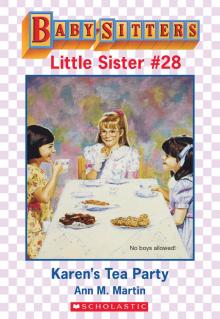 Karen's Tea Party
Karen's Tea Party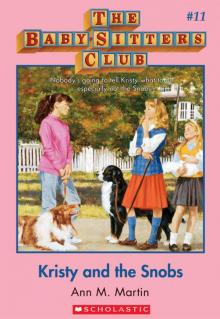 Kristy and the Snobs
Kristy and the Snobs Best Kept Secret
Best Kept Secret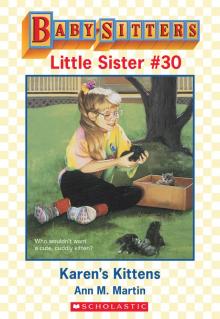 Karen's Kittens
Karen's Kittens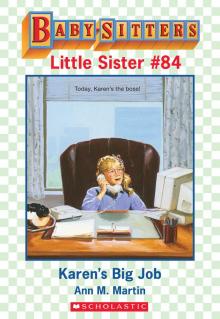 Karen's Big Job
Karen's Big Job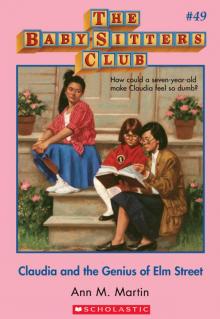 Claudia and the Genius of Elm Street
Claudia and the Genius of Elm Street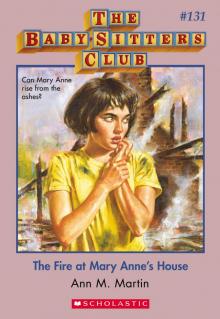 The Fire at Mary Anne's House
The Fire at Mary Anne's House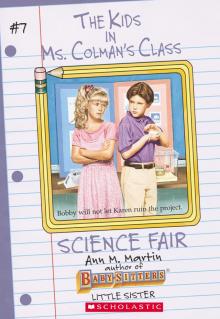 Science Fair
Science Fair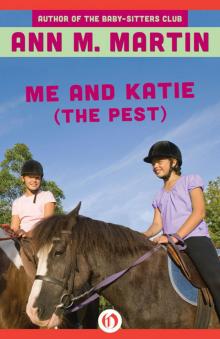 Me and Katie (The Pest)
Me and Katie (The Pest)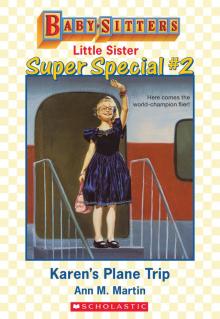 Karen's Plane Trip
Karen's Plane Trip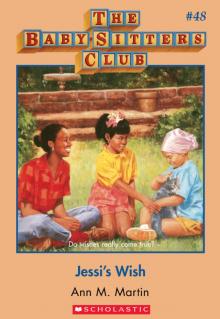 Jessi's Wish
Jessi's Wish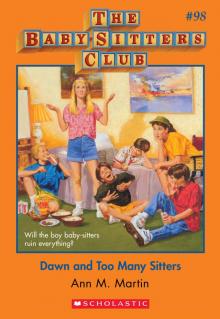 Dawn and Too Many Sitters
Dawn and Too Many Sitters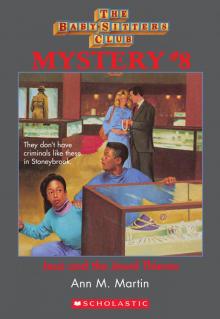 Jessi and the Jewel Thieves
Jessi and the Jewel Thieves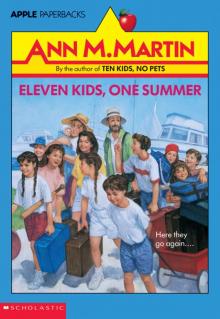 Eleven Kids, One Summer
Eleven Kids, One Summer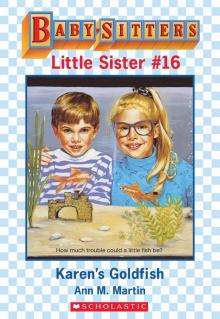 Karen's Goldfish
Karen's Goldfish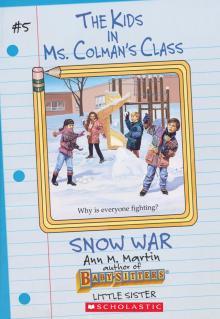 Snow War
Snow War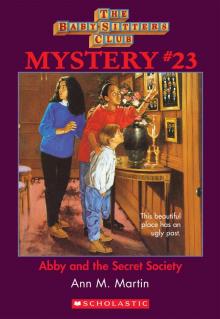 Abby and the Secret Society
Abby and the Secret Society Keeping Secrets
Keeping Secrets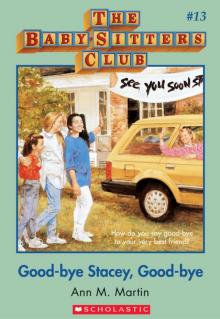 Good-Bye Stacey, Good-Bye
Good-Bye Stacey, Good-Bye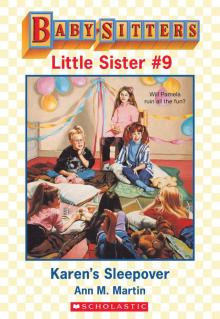 Karen's Sleepover
Karen's Sleepover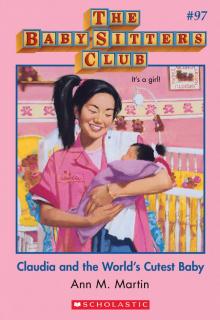 Claudia and the World's Cutest Baby
Claudia and the World's Cutest Baby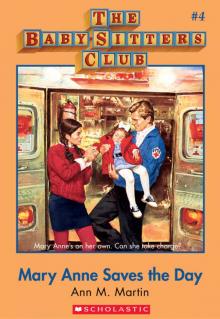 Mary Anne Saves the Day
Mary Anne Saves the Day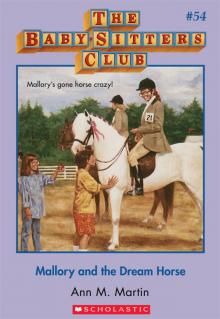 Mallory and the Dream Horse
Mallory and the Dream Horse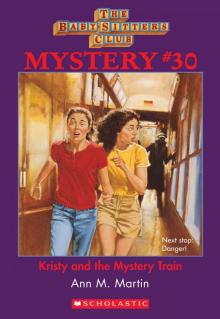 Kristy and the Mystery Train
Kristy and the Mystery Train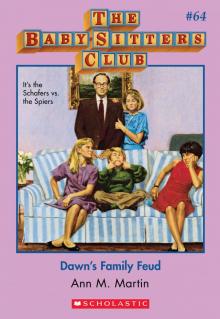 Dawn's Family Feud
Dawn's Family Feud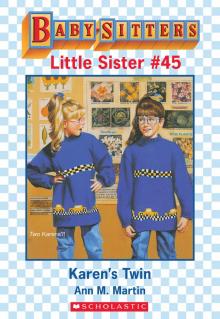 Karen's Twin
Karen's Twin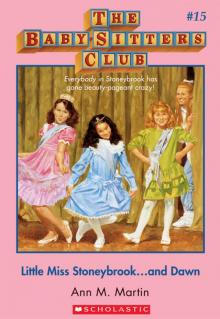 Little Miss Stoneybrook... And Dawn
Little Miss Stoneybrook... And Dawn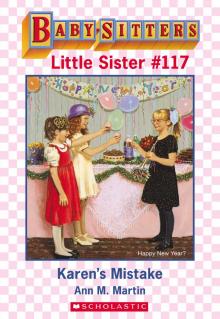 Karen's Mistake
Karen's Mistake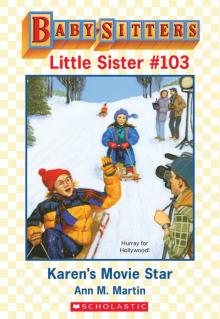 Karen's Movie Star
Karen's Movie Star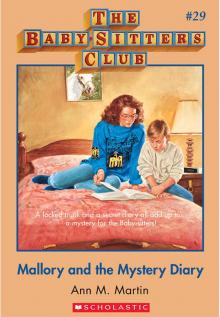 Mallory and the Mystery Diary
Mallory and the Mystery Diary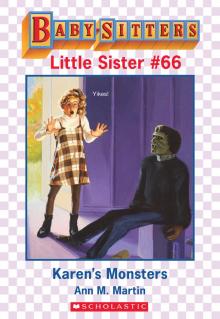 Karen's Monsters
Karen's Monsters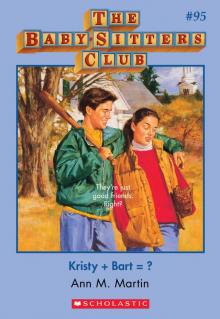 Kristy + Bart = ?
Kristy + Bart = ?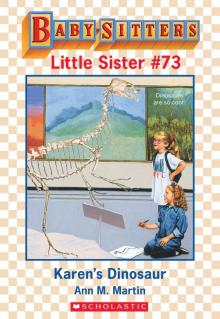 Karen's Dinosaur
Karen's Dinosaur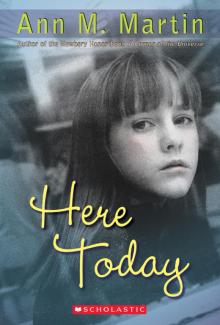 Here Today
Here Today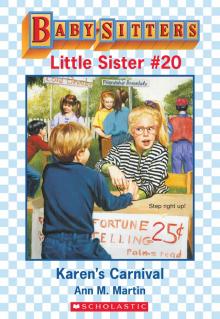 Karen's Carnival
Karen's Carnival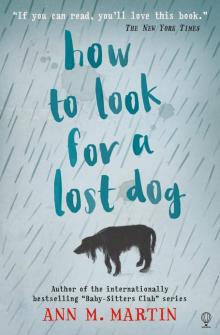 How to Look for a Lost Dog
How to Look for a Lost Dog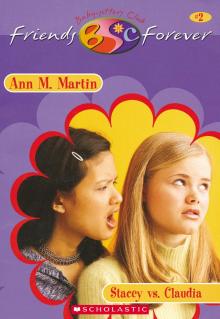 Stacey vs. Claudia
Stacey vs. Claudia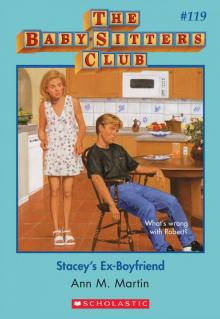 Stacey's Ex-Boyfriend
Stacey's Ex-Boyfriend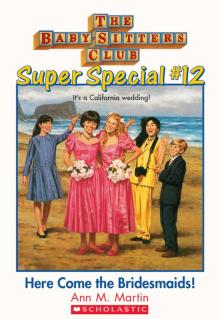 Here Come the Bridesmaids!
Here Come the Bridesmaids! Graduation Day
Graduation Day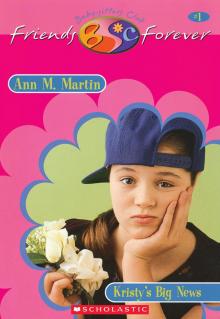 Kristy's Big News
Kristy's Big News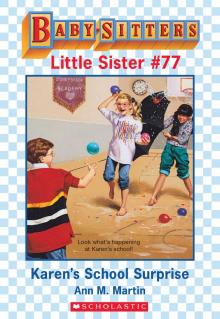 Karen's School Surprise
Karen's School Surprise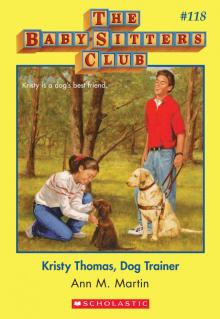 Kristy Thomas, Dog Trainer
Kristy Thomas, Dog Trainer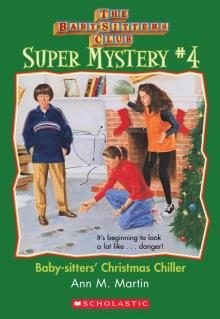 Baby-Sitters' Christmas Chiller
Baby-Sitters' Christmas Chiller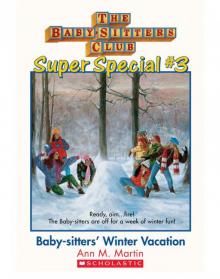 Baby-Sitters' Winter Vacation
Baby-Sitters' Winter Vacation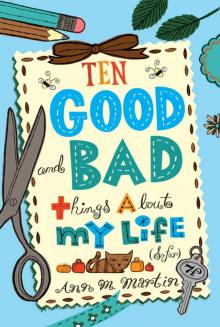 Ten Good and Bad Things About My Life
Ten Good and Bad Things About My Life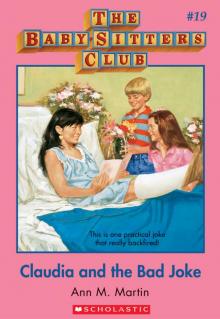 Claudia and the Bad Joke
Claudia and the Bad Joke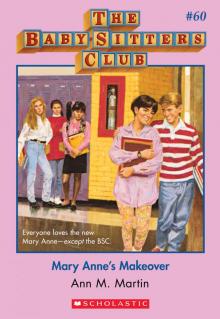 Mary Anne's Makeover
Mary Anne's Makeover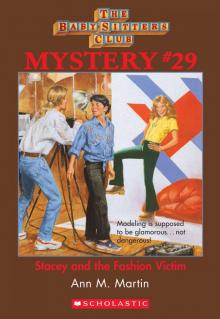 Stacey and the Fashion Victim
Stacey and the Fashion Victim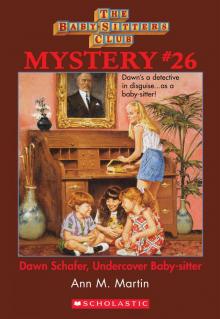 Dawn Schafer, Undercover Baby-Sitter
Dawn Schafer, Undercover Baby-Sitter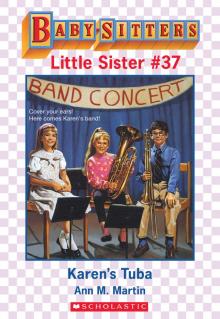 Karen's Tuba
Karen's Tuba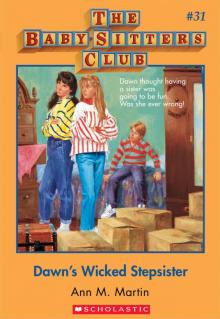 Dawn's Wicked Stepsister
Dawn's Wicked Stepsister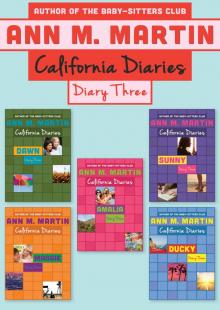 Diary Three: Dawn, Sunny, Maggie, Amalia, and Ducky
Diary Three: Dawn, Sunny, Maggie, Amalia, and Ducky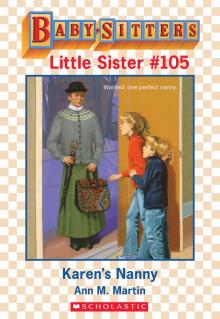 Karen's Nanny
Karen's Nanny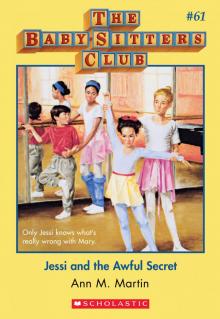 Jessi and the Awful Secret
Jessi and the Awful Secret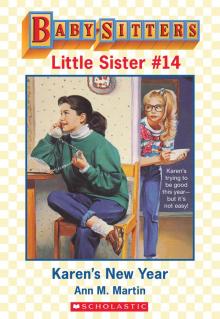 Karen's New Year
Karen's New Year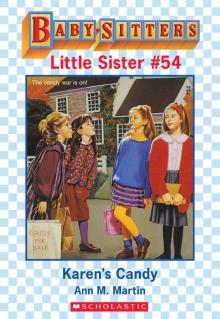 Karen's Candy
Karen's Candy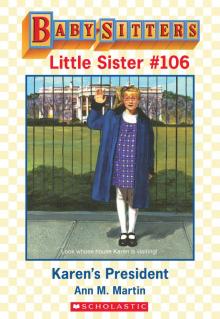 Karen's President
Karen's President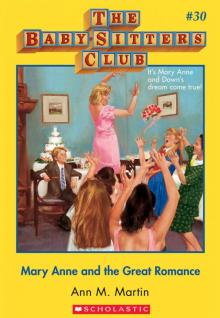 Mary Anne and the Great Romance
Mary Anne and the Great Romance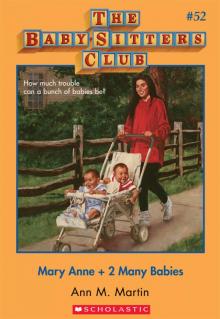 Mary Anne + 2 Many Babies
Mary Anne + 2 Many Babies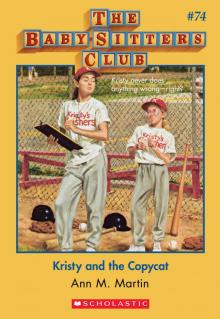 Kristy and the Copycat
Kristy and the Copycat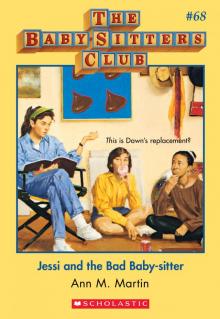 Jessi and the Bad Baby-Sitter
Jessi and the Bad Baby-Sitter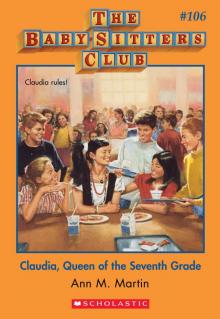 Claudia, Queen of the Seventh Grade
Claudia, Queen of the Seventh Grade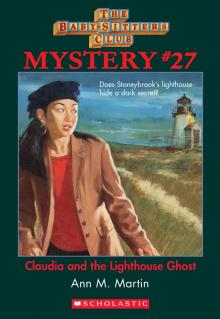 Claudia and the Lighthouse Ghost
Claudia and the Lighthouse Ghost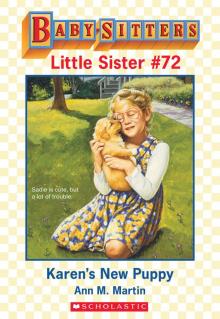 Karen's New Puppy
Karen's New Puppy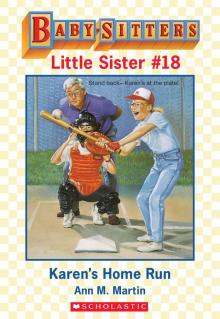 Karen's Home Run
Karen's Home Run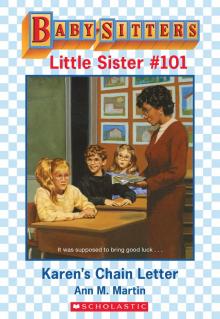 Karen's Chain Letter
Karen's Chain Letter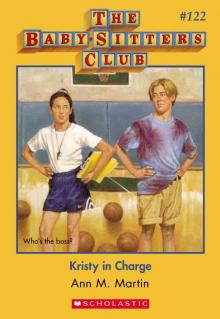 Kristy in Charge
Kristy in Charge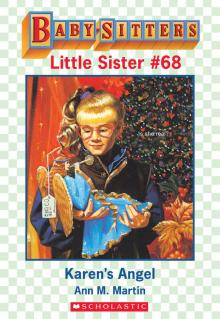 Karen's Angel
Karen's Angel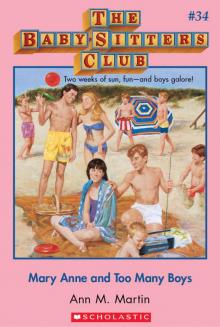 Mary Anne and Too Many Boys
Mary Anne and Too Many Boys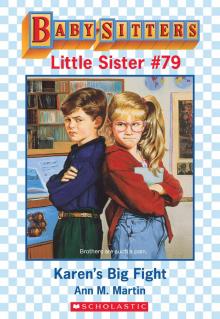 Karen's Big Fight
Karen's Big Fight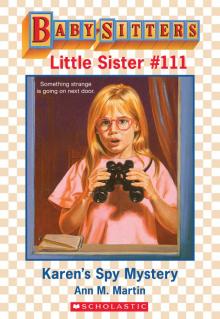 Karen's Spy Mystery
Karen's Spy Mystery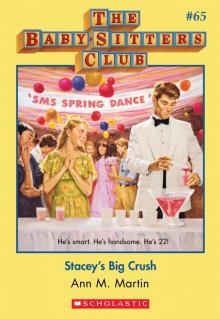 Stacey's Big Crush
Stacey's Big Crush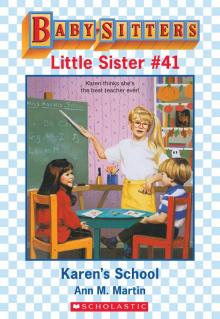 Karen's School
Karen's School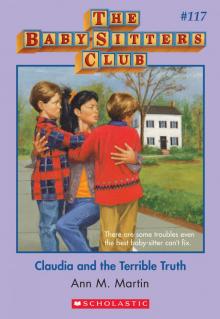 Claudia and the Terrible Truth
Claudia and the Terrible Truth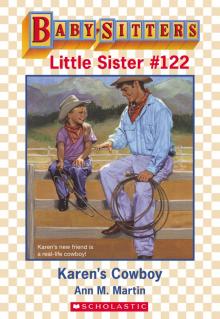 Karen's Cowboy
Karen's Cowboy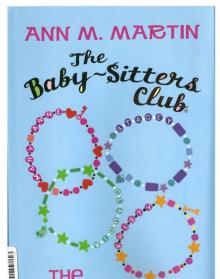 The Summer Before
The Summer Before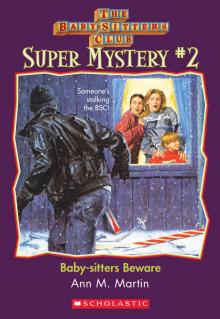 Beware, Dawn!
Beware, Dawn!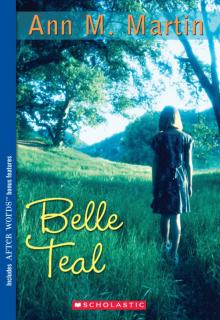 Belle Teale
Belle Teale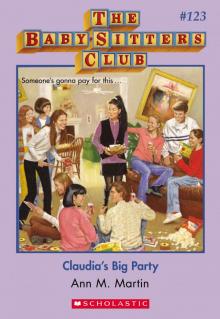 Claudia's Big Party
Claudia's Big Party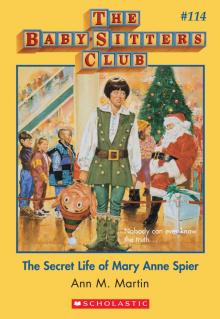 The Secret Life of Mary Anne Spier
The Secret Life of Mary Anne Spier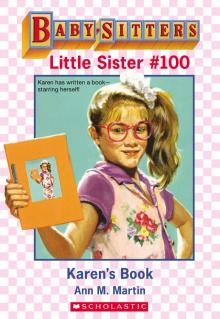 Karen's Book
Karen's Book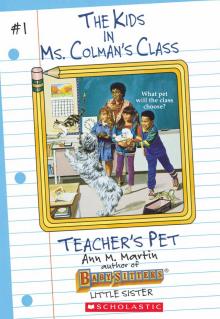 Teacher's Pet
Teacher's Pet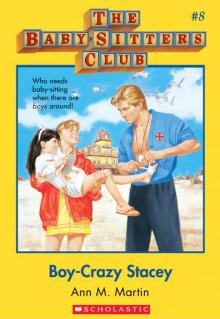 Boy-Crazy Stacey
Boy-Crazy Stacey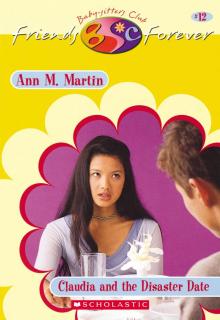 Claudia and the Disaster Date
Claudia and the Disaster Date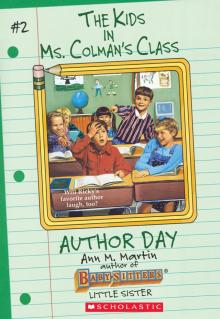 Author Day
Author Day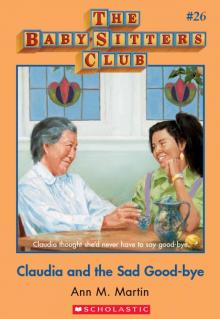 Claudia and the Sad Good-Bye
Claudia and the Sad Good-Bye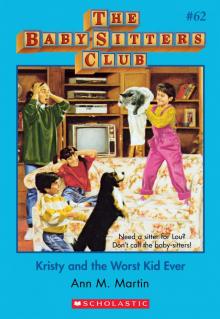 Kristy and the Worst Kid Ever
Kristy and the Worst Kid Ever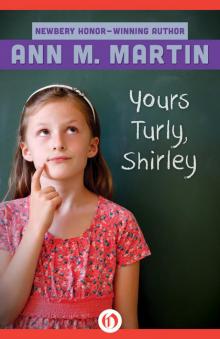 Yours Turly, Shirley
Yours Turly, Shirley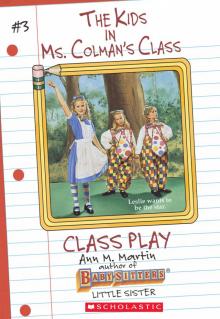 Class Play
Class Play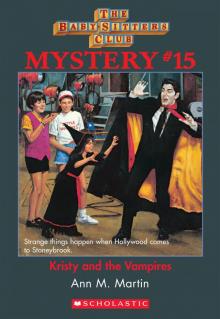 Kristy and the Vampires
Kristy and the Vampires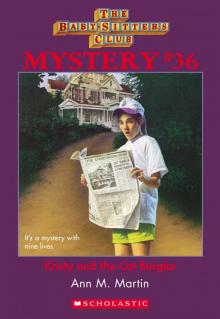 Kristy and the Cat Burglar
Kristy and the Cat Burglar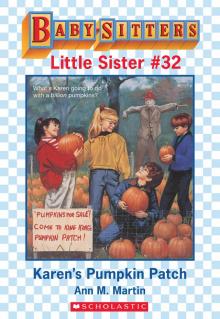 Karen's Pumpkin Patch
Karen's Pumpkin Patch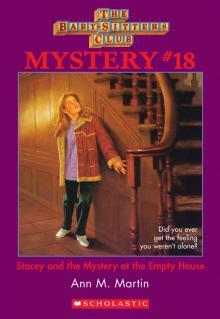 Stacey and the Mystery at the Empty House
Stacey and the Mystery at the Empty House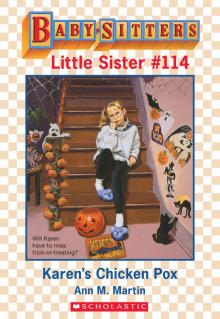 Karen's Chicken Pox
Karen's Chicken Pox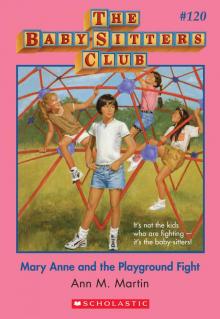 Mary Anne and the Playground Fight
Mary Anne and the Playground Fight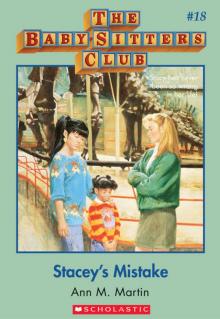 Stacey's Mistake
Stacey's Mistake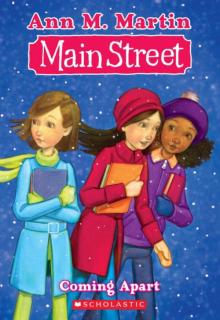 Coming Apart
Coming Apart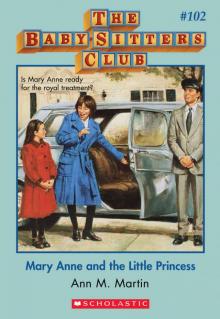 Mary Anne and the Little Princess
Mary Anne and the Little Princess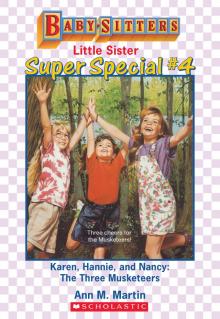 Karen, Hannie and Nancy: The Three Musketeers
Karen, Hannie and Nancy: The Three Musketeers 'Tis the Season
'Tis the Season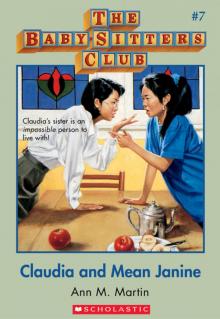 Claudia and Mean Janine
Claudia and Mean Janine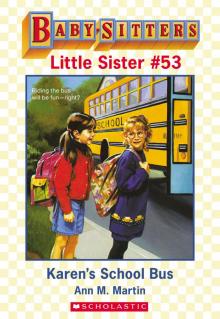 Karen's School Bus
Karen's School Bus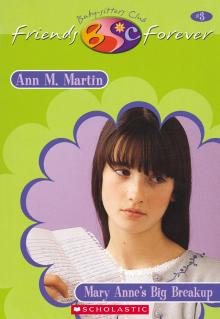 Mary Anne's Big Breakup
Mary Anne's Big Breakup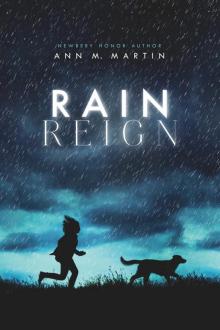 Rain Reign
Rain Reign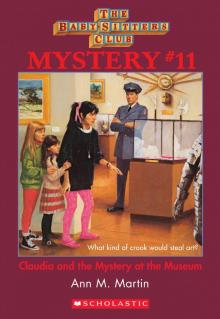 Claudia and the Mystery at the Museum
Claudia and the Mystery at the Museum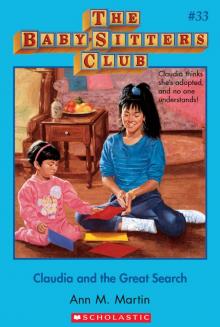 Claudia and the Great Search
Claudia and the Great Search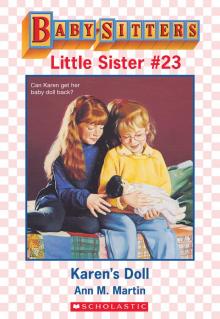 Karen's Doll
Karen's Doll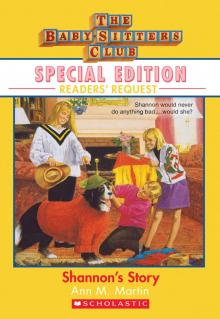 Shannon's Story
Shannon's Story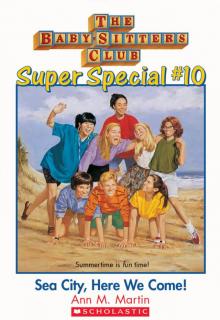 Sea City, Here We Come!
Sea City, Here We Come!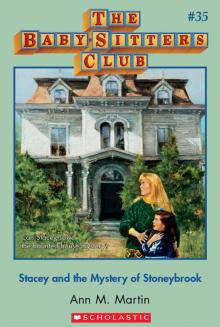 Stacey and the Mystery of Stoneybrook
Stacey and the Mystery of Stoneybrook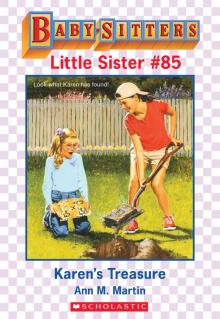 Karen's Treasure
Karen's Treasure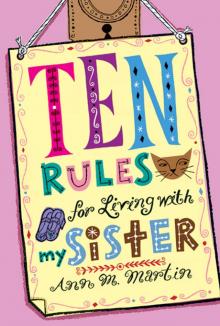 Ten Rules for Living With My Sister
Ten Rules for Living With My Sister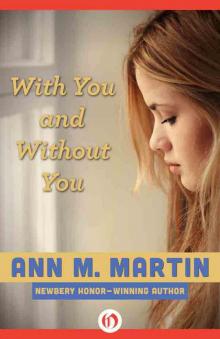 With You and Without You
With You and Without You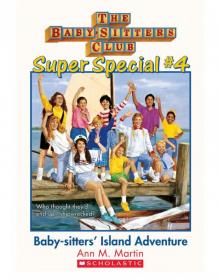 Baby-Sitters' Island Adventure
Baby-Sitters' Island Adventure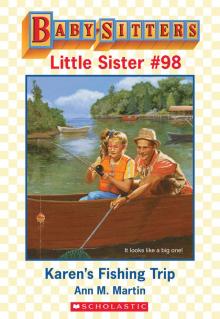 Karen's Fishing Trip
Karen's Fishing Trip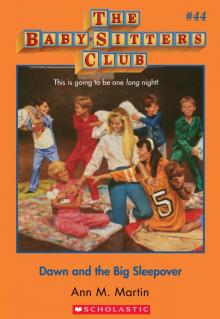 Dawn and the Big Sleepover
Dawn and the Big Sleepover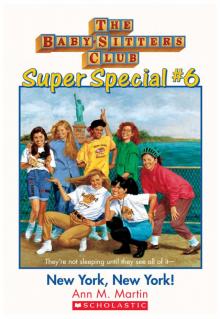 New York, New York!
New York, New York!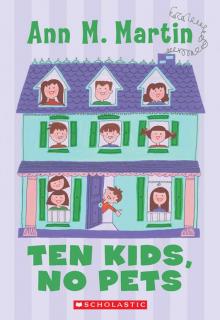 Ten Kids, No Pets
Ten Kids, No Pets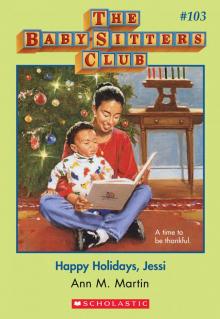 Happy Holidays, Jessi
Happy Holidays, Jessi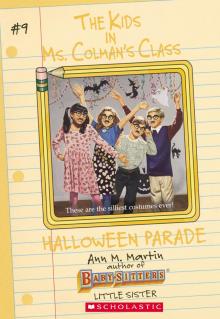 Halloween Parade
Halloween Parade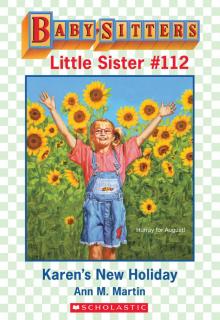 Karen's New Holiday
Karen's New Holiday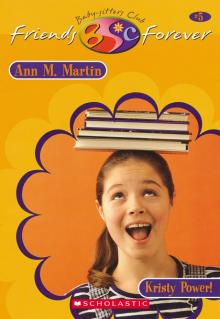 Kristy Power!
Kristy Power!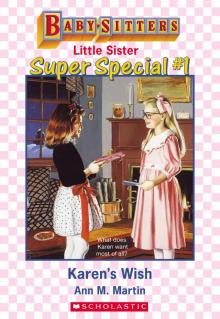 Karen's Wish
Karen's Wish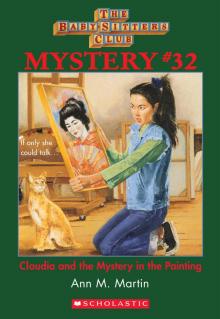 Claudia and the Mystery in the Painting
Claudia and the Mystery in the Painting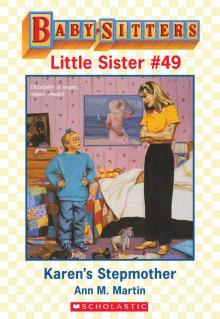 Karen's Stepmother
Karen's Stepmother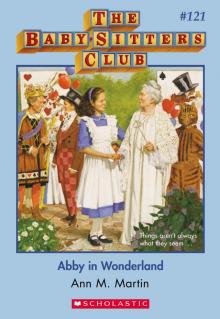 Abby in Wonderland
Abby in Wonderland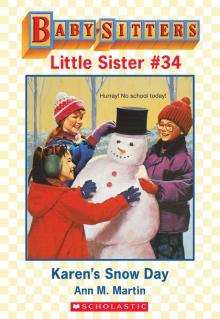 Karen's Snow Day
Karen's Snow Day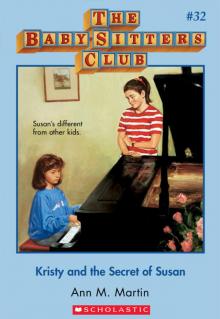 Kristy and the Secret of Susan
Kristy and the Secret of Susan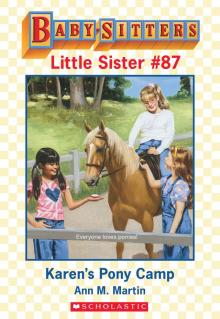 Karen's Pony Camp
Karen's Pony Camp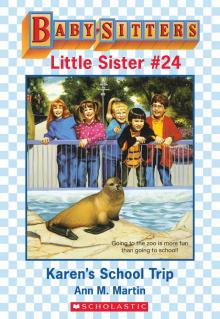 Karen's School Trip
Karen's School Trip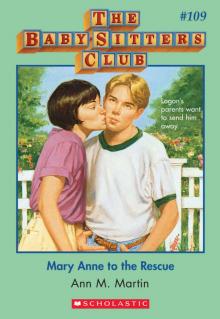 Mary Anne to the Rescue
Mary Anne to the Rescue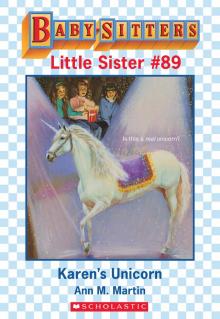 Karen's Unicorn
Karen's Unicorn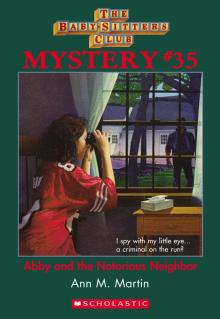 Abby and the Notorious Neighbor
Abby and the Notorious Neighbor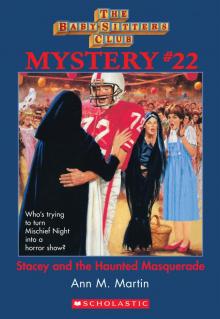 Stacey and the Haunted Masquerade
Stacey and the Haunted Masquerade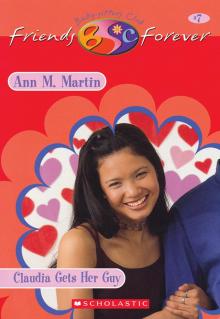 Claudia Gets Her Guy
Claudia Gets Her Guy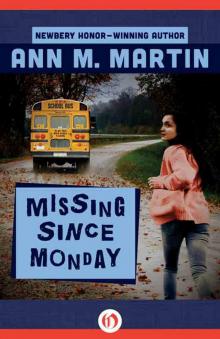 Missing Since Monday
Missing Since Monday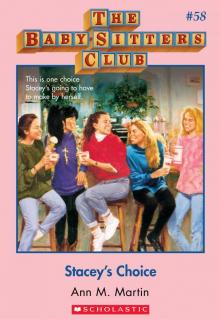 Stacey's Choice
Stacey's Choice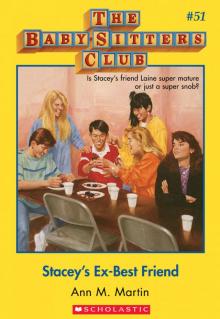 Stacey's Ex-Best Friend
Stacey's Ex-Best Friend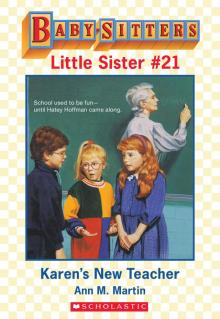 Karen's New Teacher
Karen's New Teacher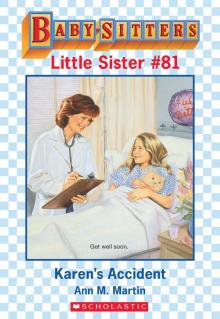 Karen's Accident
Karen's Accident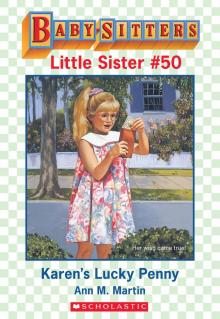 Karen's Lucky Penny
Karen's Lucky Penny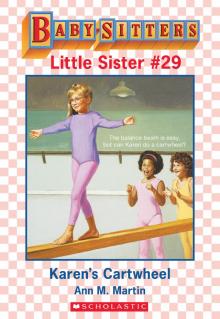 Karen's Cartwheel
Karen's Cartwheel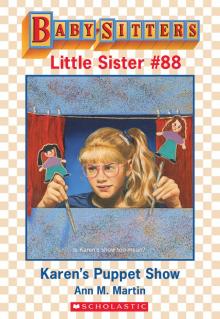 Karen's Puppet Show
Karen's Puppet Show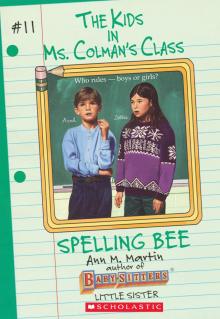 Spelling Bee
Spelling Bee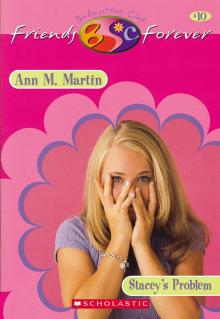 Stacey's Problem
Stacey's Problem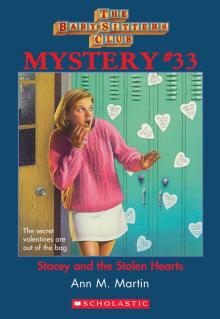 Stacey and the Stolen Hearts
Stacey and the Stolen Hearts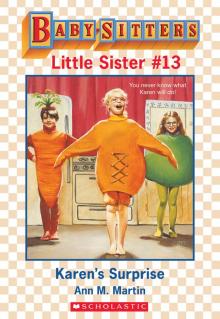 Karen's Surprise
Karen's Surprise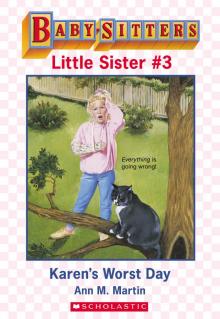 Karen's Worst Day
Karen's Worst Day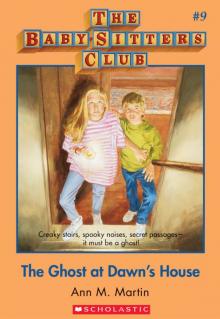 The Ghost at Dawn's House
The Ghost at Dawn's House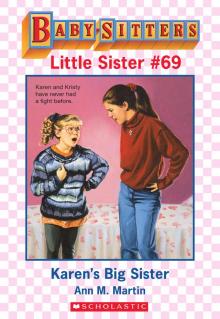 Karen's Big Sister
Karen's Big Sister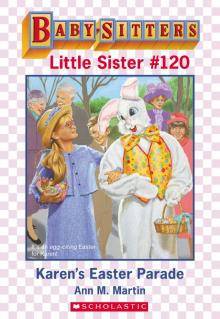 Karen's Easter Parade
Karen's Easter Parade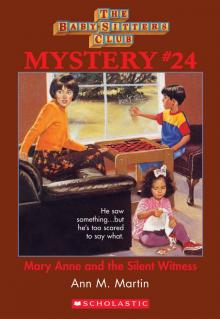 Mary Anne and the Silent Witness
Mary Anne and the Silent Witness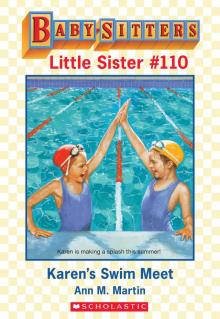 Karen's Swim Meet
Karen's Swim Meet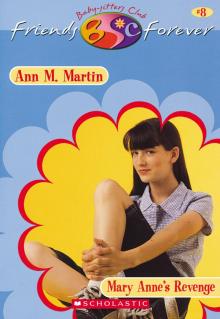 Mary Anne's Revenge
Mary Anne's Revenge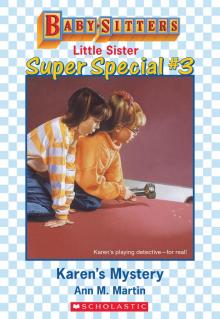 Karen's Mystery
Karen's Mystery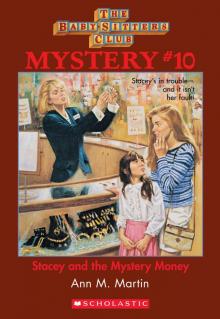 Stacey and the Mystery Money
Stacey and the Mystery Money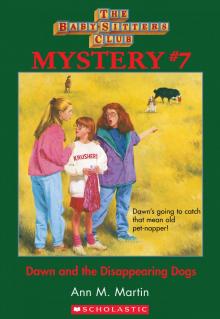 Dawn and the Disappearing Dogs
Dawn and the Disappearing Dogs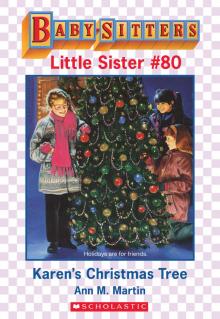 Karen's Christmas Tree
Karen's Christmas Tree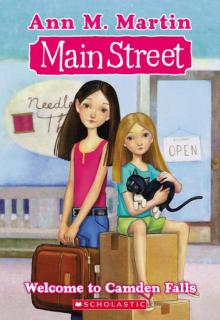 Welcome to Camden Falls
Welcome to Camden Falls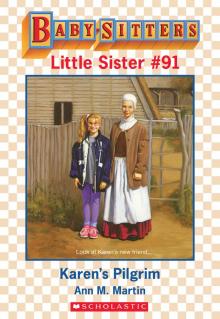 Karen's Pilgrim
Karen's Pilgrim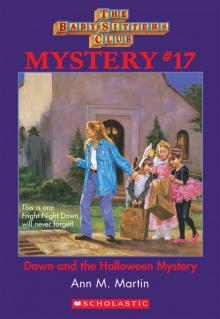 Dawn and the Halloween Mystery
Dawn and the Halloween Mystery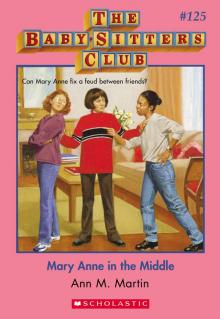 Mary Anne in the Middle
Mary Anne in the Middle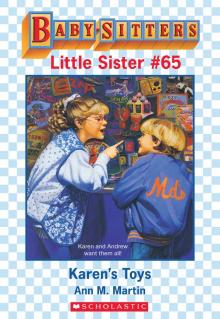 Karen's Toys
Karen's Toys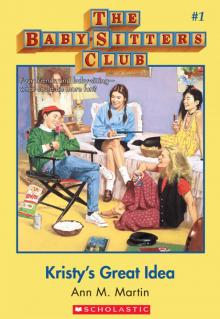 Kristy's Great Idea
Kristy's Great Idea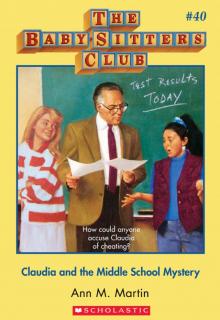 Claudia and the Middle School Mystery
Claudia and the Middle School Mystery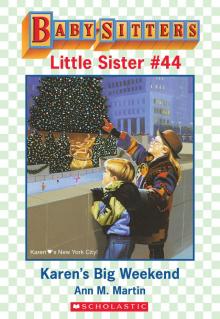 Karen's Big Weekend
Karen's Big Weekend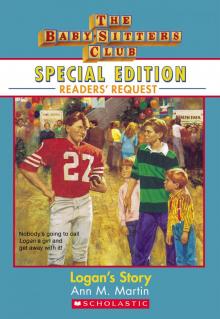 Logan's Story
Logan's Story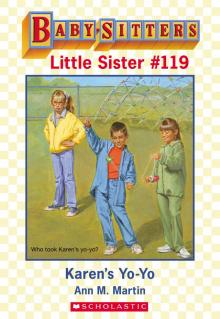 Karen's Yo-Yo
Karen's Yo-Yo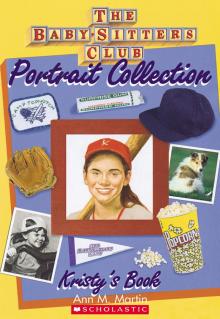 Kristy's Book
Kristy's Book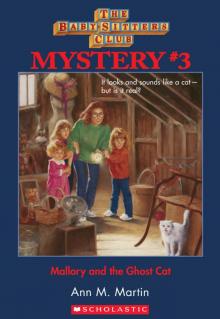 Mallory and the Ghost Cat
Mallory and the Ghost Cat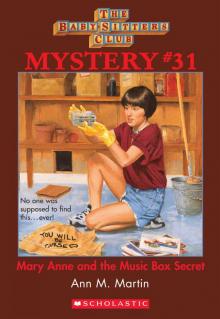 Mary Anne and the Music
Mary Anne and the Music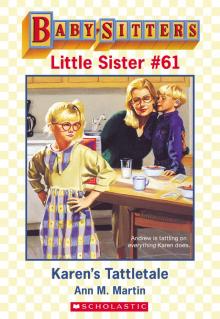 Karen's Tattletale
Karen's Tattletale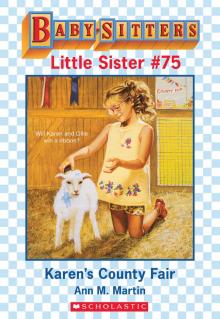 Karen's County Fair
Karen's County Fair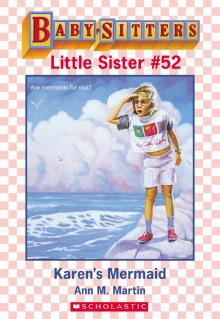 Karen's Mermaid
Karen's Mermaid Snowbound
Snowbound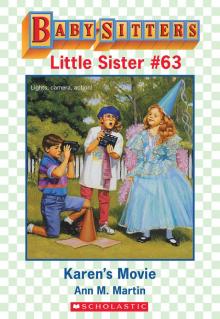 Karen's Movie
Karen's Movie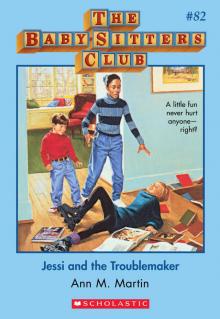 Jessi and the Troublemaker
Jessi and the Troublemaker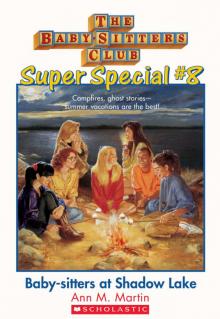 Baby-Sitters at Shadow Lake
Baby-Sitters at Shadow Lake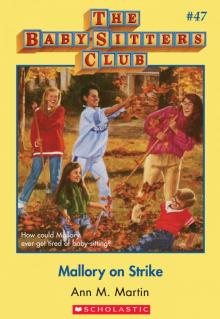 Mallory on Strike
Mallory on Strike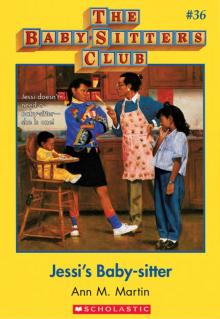 Jessi's Baby-Sitter
Jessi's Baby-Sitter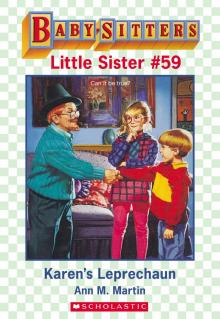 Karen's Leprechaun
Karen's Leprechaun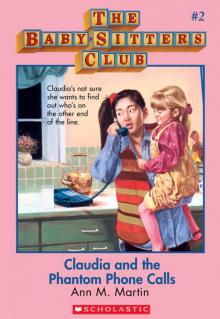 Claudia and the Phantom Phone Calls
Claudia and the Phantom Phone Calls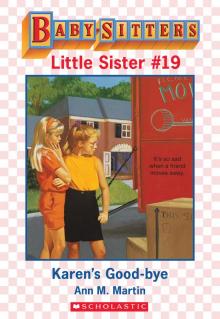 Karen's Good-Bye
Karen's Good-Bye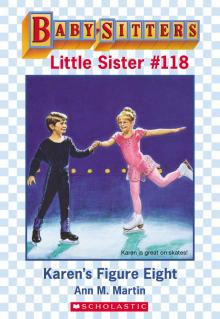 Karen's Figure Eight
Karen's Figure Eight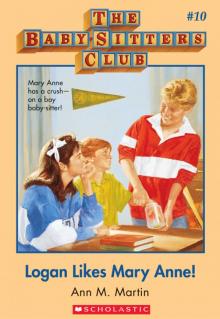 Logan Likes Mary Anne!
Logan Likes Mary Anne!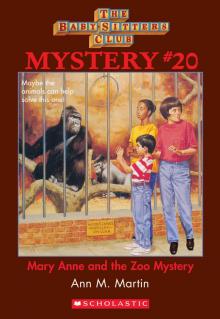 Mary Anne and the Zoo Mystery
Mary Anne and the Zoo Mystery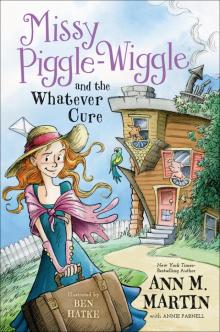 Missy Piggle-Wiggle and the Whatever Cure
Missy Piggle-Wiggle and the Whatever Cure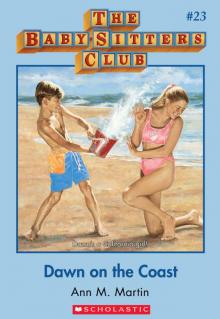 Dawn on the Coast
Dawn on the Coast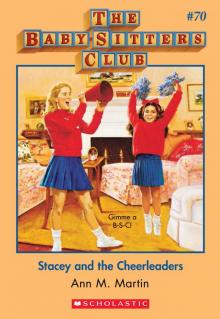 Stacey and the Cheerleaders
Stacey and the Cheerleaders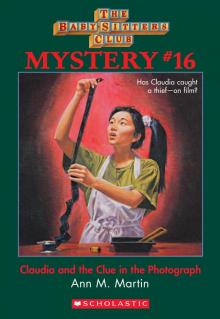 Claudia and the Clue in the Photograph
Claudia and the Clue in the Photograph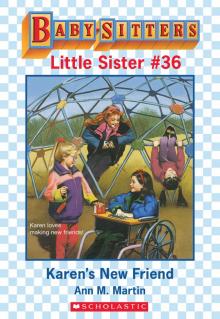 Karen's New Friend
Karen's New Friend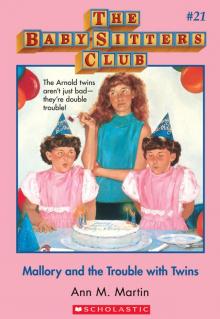 Mallory and the Trouble With Twins
Mallory and the Trouble With Twins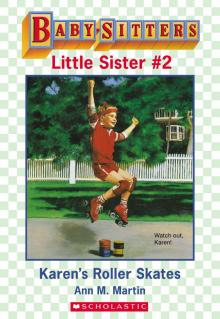 Karen's Roller Skates
Karen's Roller Skates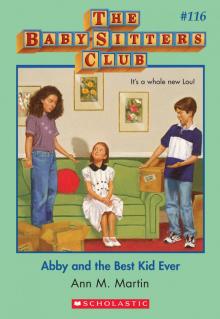 Abby and the Best Kid Ever
Abby and the Best Kid Ever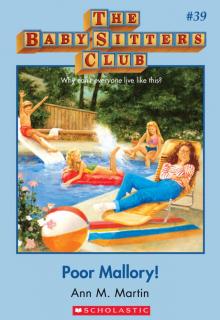 Poor Mallory!
Poor Mallory!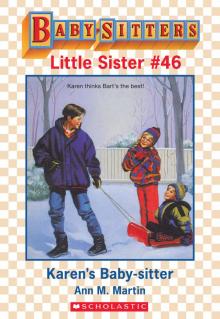 Karen's Witch
Karen's Witch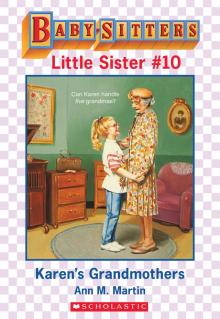 Karen's Grandmothers
Karen's Grandmothers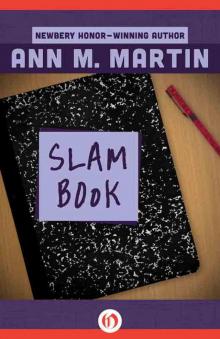 Slam Book
Slam Book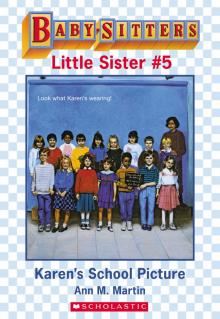 Karen's School Picture
Karen's School Picture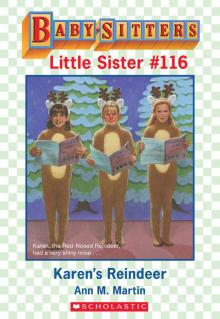 Karen's Reindeer
Karen's Reindeer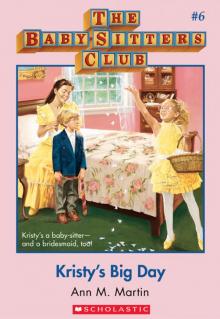 Kristy's Big Day
Kristy's Big Day The Long Way Home
The Long Way Home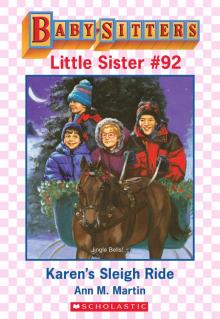 Karen's Sleigh Ride
Karen's Sleigh Ride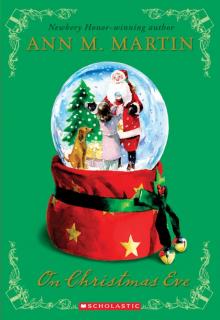 On Christmas Eve
On Christmas Eve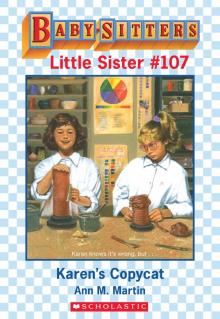 Karen's Copycat
Karen's Copycat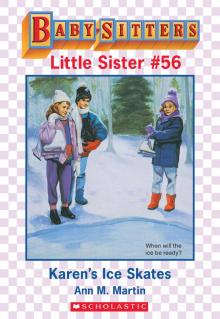 Karen's Ice Skates
Karen's Ice Skates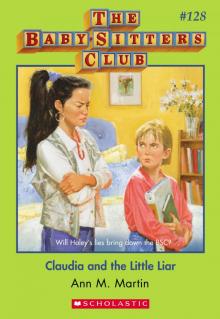 Claudia and the Little Liar
Claudia and the Little Liar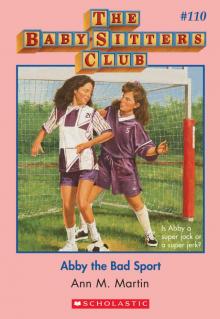 Abby the Bad Sport
Abby the Bad Sport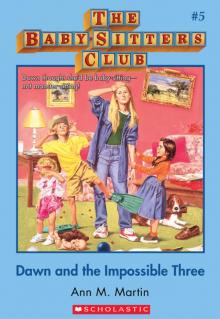 The Baby-Sitters Club #5: Dawn and the Impossible Three
The Baby-Sitters Club #5: Dawn and the Impossible Three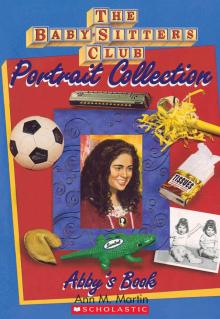 Abby's Book
Abby's Book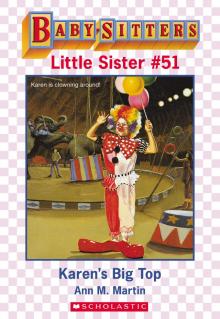 Karen's Big Top
Karen's Big Top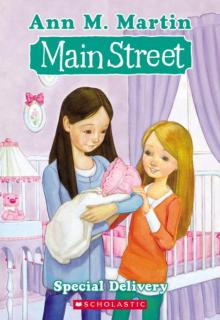 Main Street #8: Special Delivery
Main Street #8: Special Delivery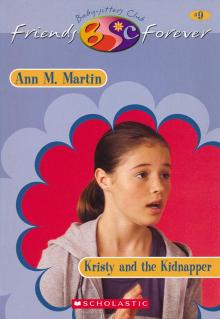 Kristy and the Kidnapper
Kristy and the Kidnapper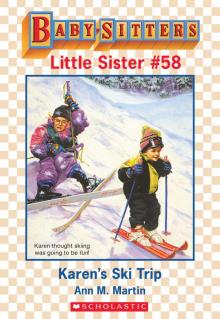 Karen's Ski Trip
Karen's Ski Trip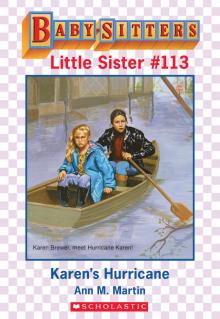 Karen's Hurricane
Karen's Hurricane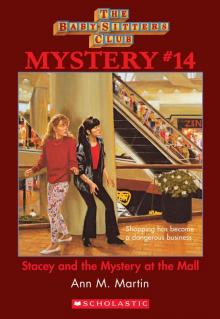 Stacey and the Mystery at the Mall
Stacey and the Mystery at the Mall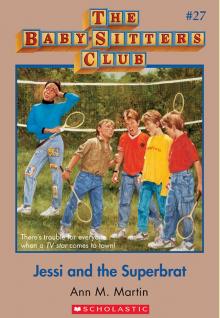 Jessi and the Superbrat
Jessi and the Superbrat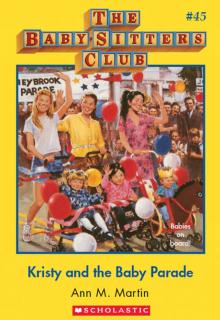 Kristy and the Baby Parade
Kristy and the Baby Parade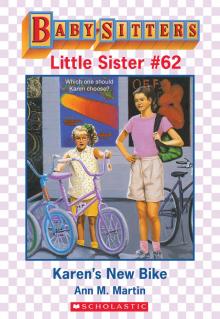 Karen's New Bike
Karen's New Bike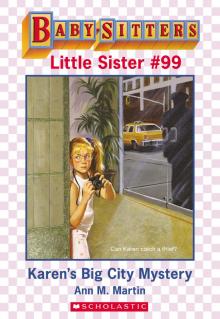 Karen's Big City Mystery
Karen's Big City Mystery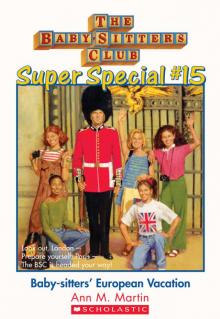 Baby-Sitters' European Vacation
Baby-Sitters' European Vacation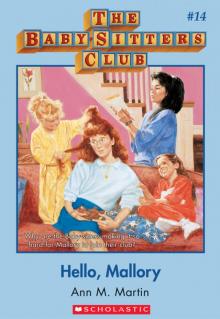 Hello, Mallory
Hello, Mallory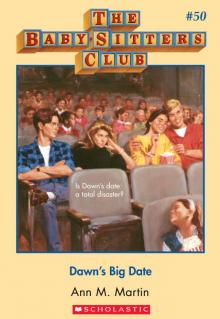 Dawn's Big Date
Dawn's Big Date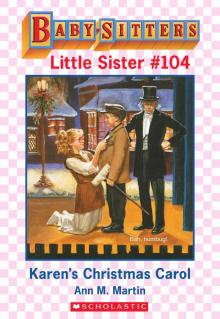 Karen's Christmas Carol
Karen's Christmas Carol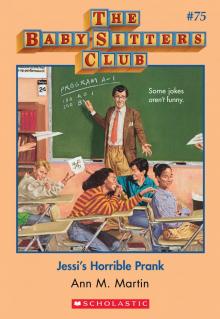 Jessi's Horrible Prank
Jessi's Horrible Prank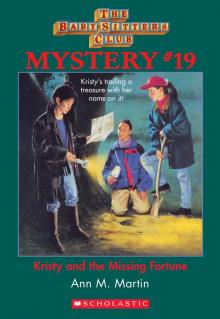 Kristy and the Missing Fortune
Kristy and the Missing Fortune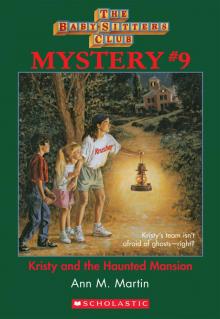 Kristy and the Haunted Mansion
Kristy and the Haunted Mansion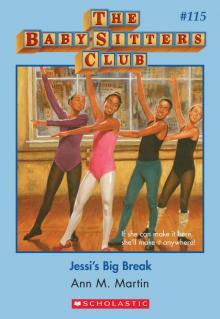 Jessi's Big Break
Jessi's Big Break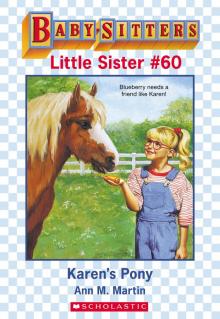 Karen's Pony
Karen's Pony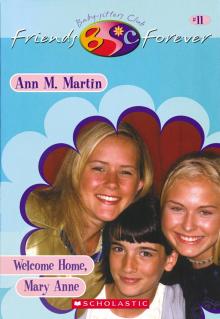 Welcome Home, Mary Anne
Welcome Home, Mary Anne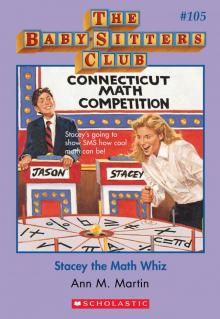 Stacey the Math Whiz
Stacey the Math Whiz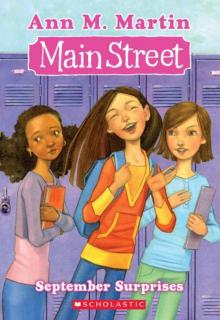 September Surprises
September Surprises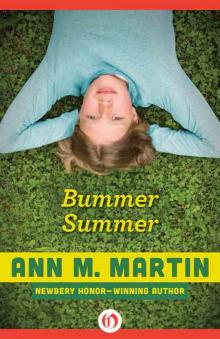 Bummer Summer
Bummer Summer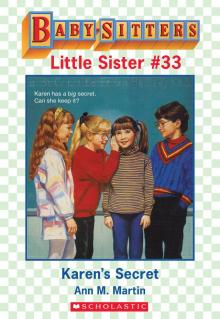 Karen's Secret
Karen's Secret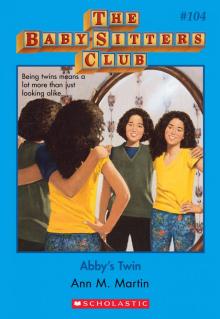 Abby's Twin
Abby's Twin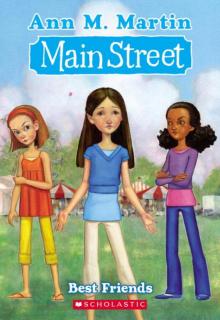 Main Street #4: Best Friends
Main Street #4: Best Friends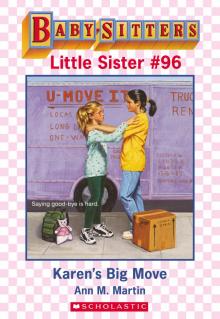 Karen's Big Move
Karen's Big Move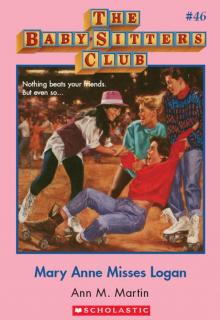 Mary Anne Misses Logan
Mary Anne Misses Logan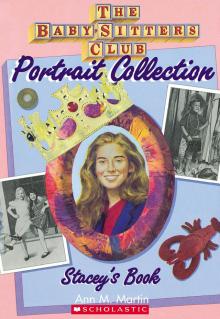 Stacey's Book
Stacey's Book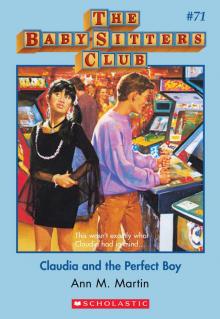 Claudia and the Perfect Boy
Claudia and the Perfect Boy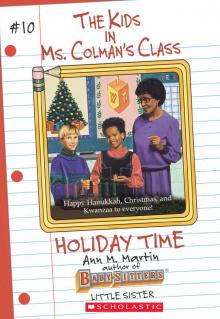 Holiday Time
Holiday Time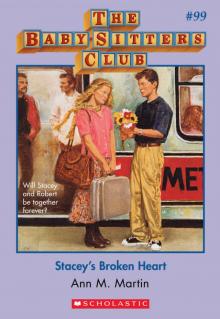 Stacey's Broken Heart
Stacey's Broken Heart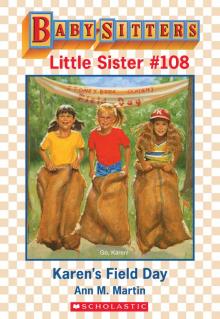 Karen's Field Day
Karen's Field Day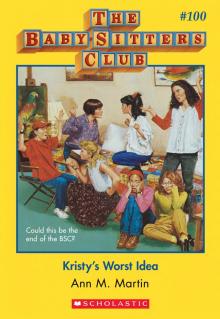 Kristy's Worst Idea
Kristy's Worst Idea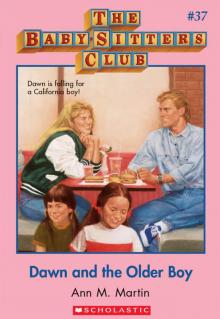 Dawn and the Older Boy
Dawn and the Older Boy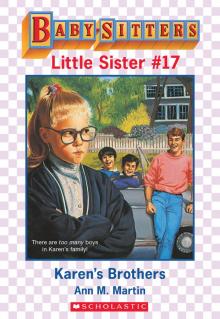 Karen's Brothers
Karen's Brothers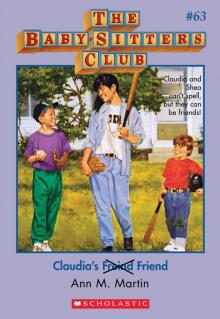 Claudia's Friend
Claudia's Friend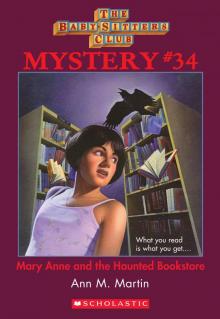 Mary Anne and the Haunted Bookstore
Mary Anne and the Haunted Bookstore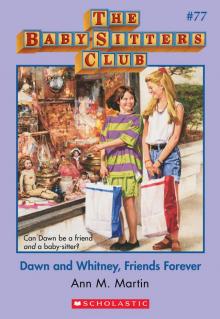 Dawn and Whitney, Friends Forever
Dawn and Whitney, Friends Forever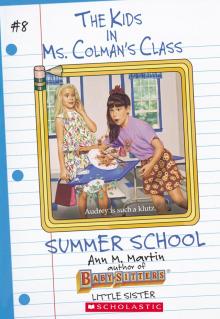 Summer School
Summer School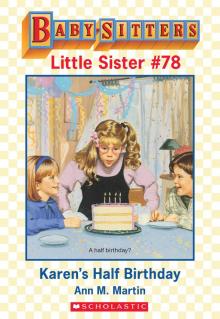 Karen's Birthday
Karen's Birthday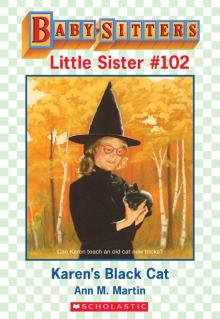 Karen's Black Cat
Karen's Black Cat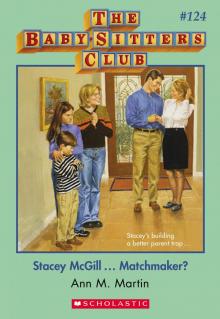 Stacey McGill... Matchmaker?
Stacey McGill... Matchmaker?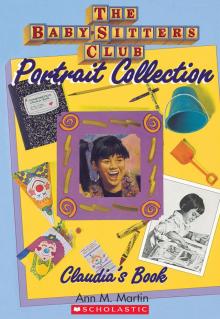 Claudia's Book
Claudia's Book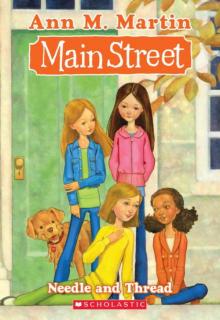 Main Street #2: Needle and Thread
Main Street #2: Needle and Thread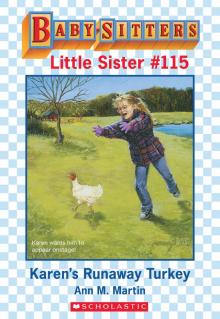 Karen's Runaway Turkey
Karen's Runaway Turkey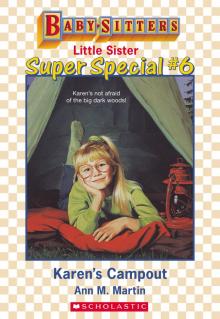 Karen's Campout
Karen's Campout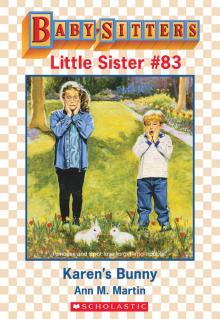 Karen's Bunny
Karen's Bunny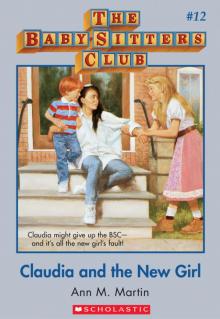 Claudia and the New Girl
Claudia and the New Girl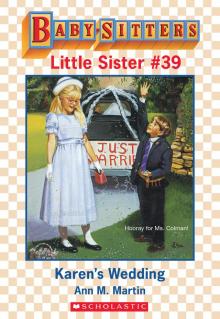 Karen's Wedding
Karen's Wedding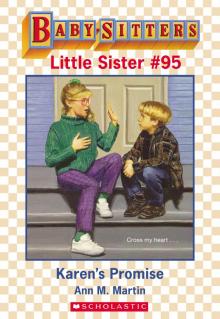 Karen's Promise
Karen's Promise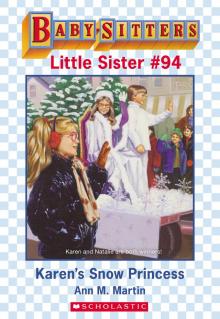 Karen's Snow Princess
Karen's Snow Princess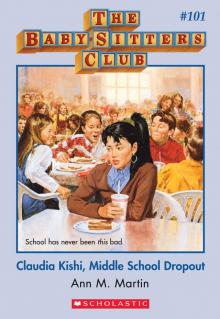 Claudia Kishi, Middle School Dropout
Claudia Kishi, Middle School Dropout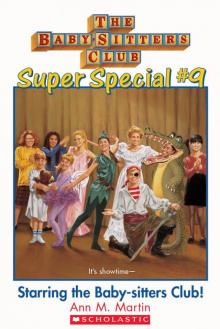 Starring the Baby-Sitters Club!
Starring the Baby-Sitters Club!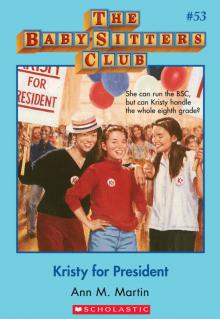 Kristy for President
Kristy for President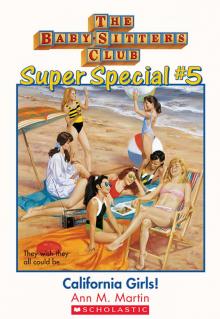 California Girls!
California Girls!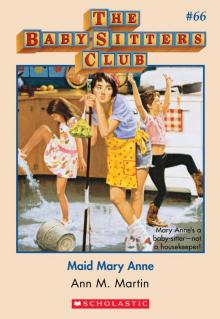 Maid Mary Anne
Maid Mary Anne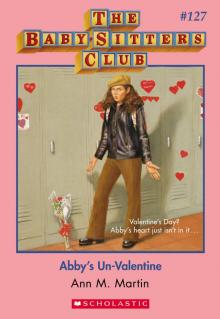 Abby's Un-Valentine
Abby's Un-Valentine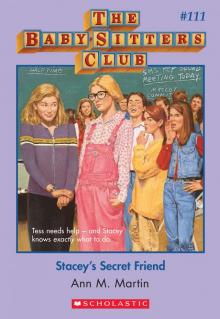 Stacey's Secret Friend
Stacey's Secret Friend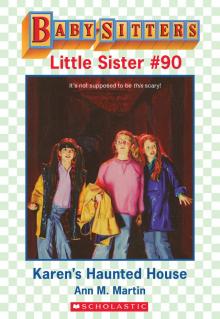 Karen's Haunted House
Karen's Haunted House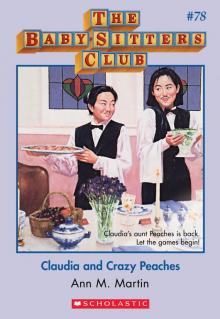 Claudia and Crazy Peaches
Claudia and Crazy Peaches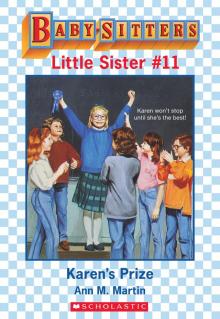 Karen's Prize
Karen's Prize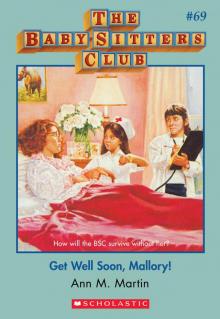 Get Well Soon, Mallory!
Get Well Soon, Mallory!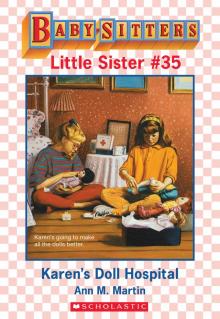 Karen's Doll Hospital
Karen's Doll Hospital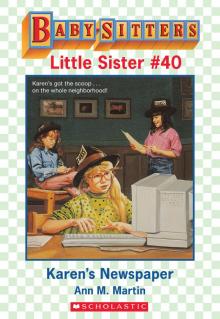 Karen's Newspaper
Karen's Newspaper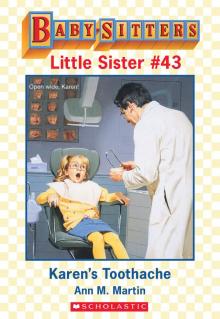 Karen's Toothache
Karen's Toothache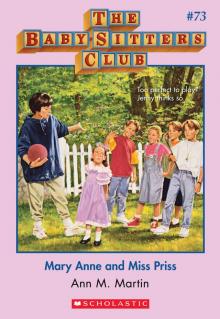 Mary Anne and Miss Priss
Mary Anne and Miss Priss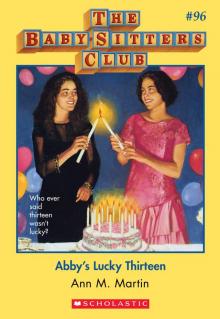 Abby's Lucky Thirteen
Abby's Lucky Thirteen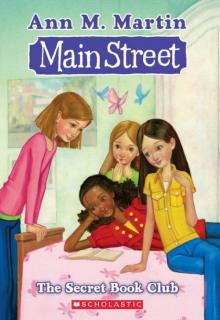 The Secret Book Club
The Secret Book Club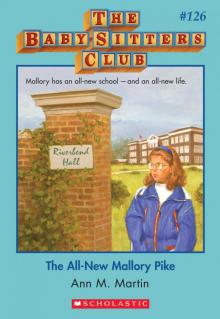 The All-New Mallory Pike
The All-New Mallory Pike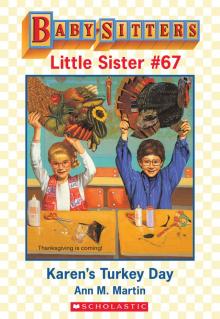 Karen's Turkey Day
Karen's Turkey Day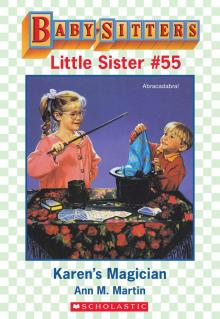 Karen's Magician
Karen's Magician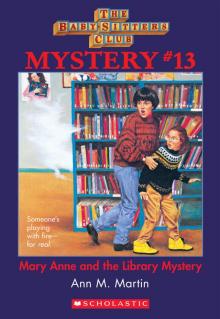 Mary Anne and the Library Mystery
Mary Anne and the Library Mystery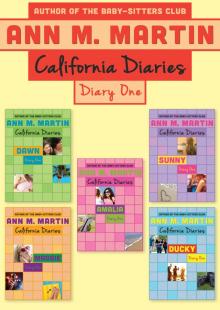 Diary One: Dawn, Sunny, Maggie, Amalia, and Ducky
Diary One: Dawn, Sunny, Maggie, Amalia, and Ducky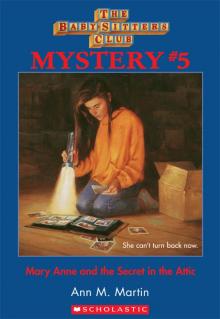 Mary Anne and the Secret in the Attic
Mary Anne and the Secret in the Attic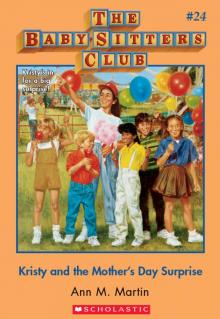 Kristy and the Mother's Day Surprise
Kristy and the Mother's Day Surprise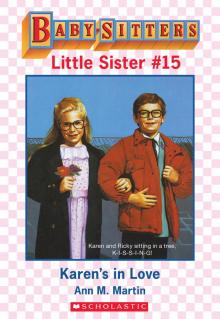 Karen's in Love
Karen's in Love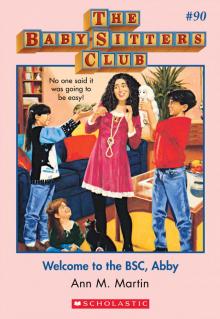 Welcome to the BSC, Abby
Welcome to the BSC, Abby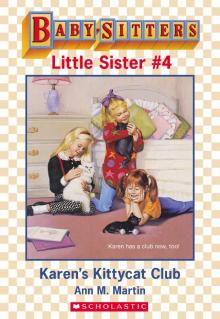 Karen's Kittycat Club
Karen's Kittycat Club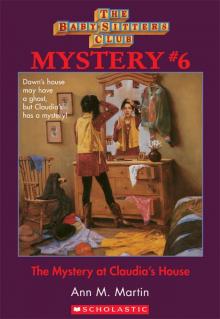 The Mystery at Claudia's House
The Mystery at Claudia's House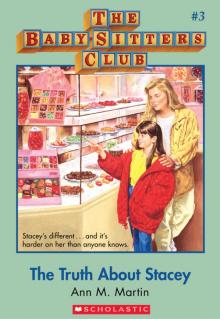 The Truth About Stacey
The Truth About Stacey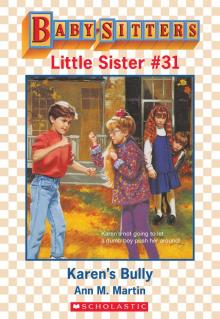 Karen's Bully
Karen's Bully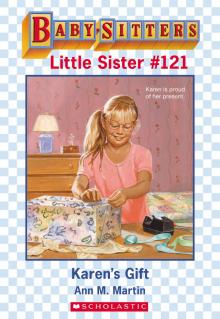 Karen's Gift
Karen's Gift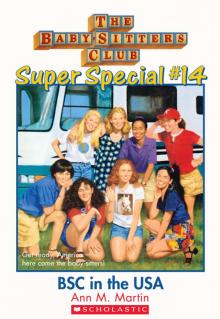 BSC in the USA
BSC in the USA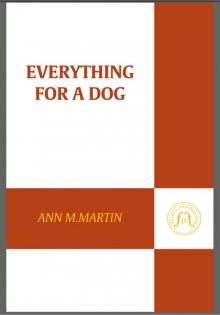 Everything for a Dog
Everything for a Dog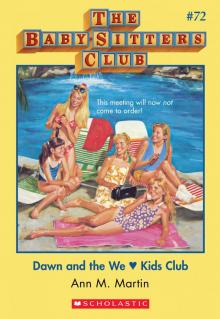 Dawn and the We Love Kids Club
Dawn and the We Love Kids Club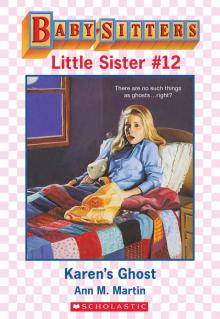 Karen's Ghost
Karen's Ghost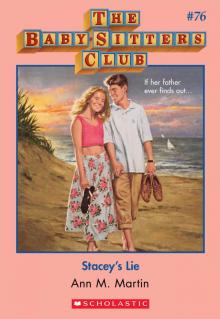 Stacey's Lie
Stacey's Lie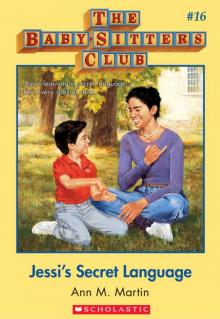 Jessi's Secret Language
Jessi's Secret Language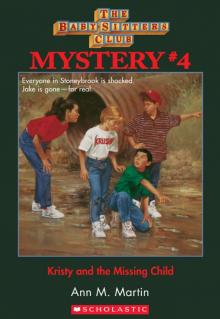 Kristy and the Missing Child
Kristy and the Missing Child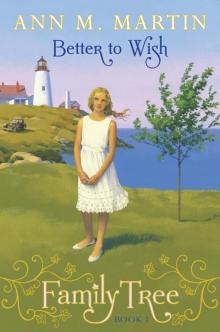 Better to Wish
Better to Wish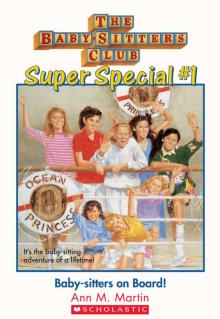 Baby-Sitters on Board!
Baby-Sitters on Board!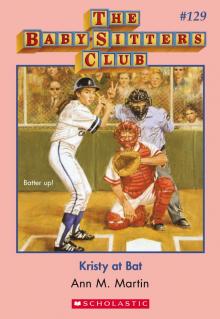 Kristy at Bat
Kristy at Bat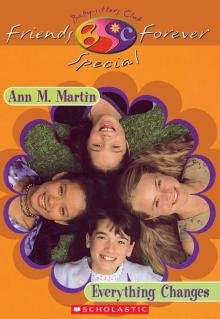 Everything Changes
Everything Changes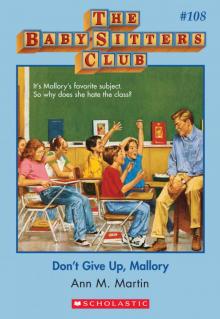 Don't Give Up, Mallory
Don't Give Up, Mallory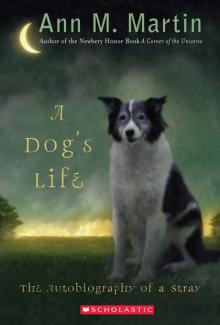 A Dog's Life: The Autobiography of a Stray
A Dog's Life: The Autobiography of a Stray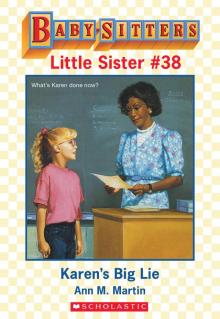 Karen's Big Lie
Karen's Big Lie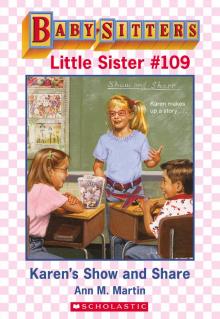 Karen's Show and Share
Karen's Show and Share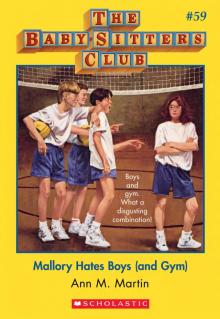 Mallory Hates Boys (and Gym)
Mallory Hates Boys (and Gym)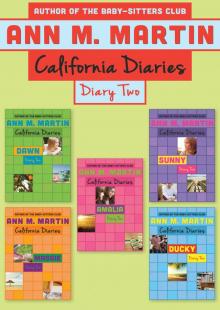 Diary Two: Dawn, Sunny, Maggie, Amalia, and Ducky
Diary Two: Dawn, Sunny, Maggie, Amalia, and Ducky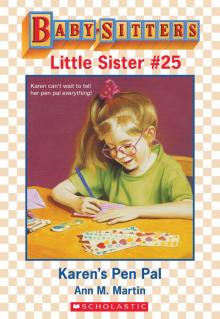 Karen's Pen Pal
Karen's Pen Pal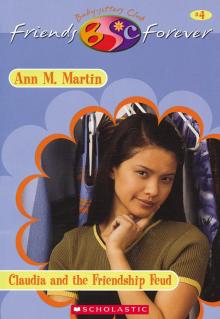 Claudia and the Friendship Feud
Claudia and the Friendship Feud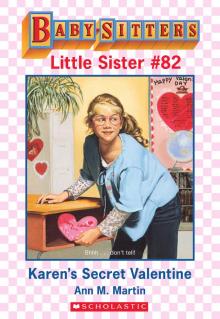 Karen's Secret Valentine
Karen's Secret Valentine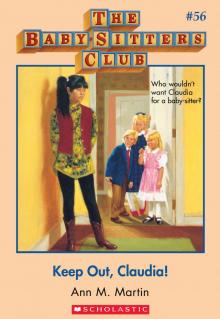 Keep Out, Claudia!
Keep Out, Claudia!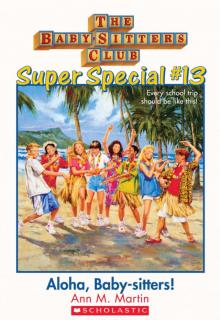 Aloha, Baby-Sitters!
Aloha, Baby-Sitters!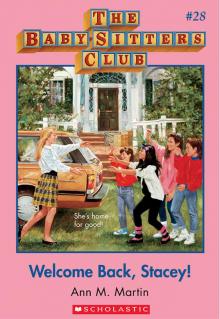 Welcome Back, Stacey
Welcome Back, Stacey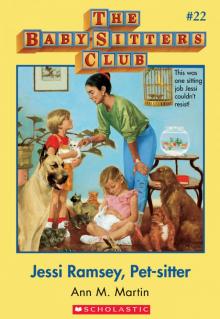 Jessi Ramsey, Pet-Sitter
Jessi Ramsey, Pet-Sitter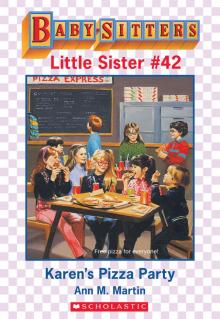 Karen's Pizza Party
Karen's Pizza Party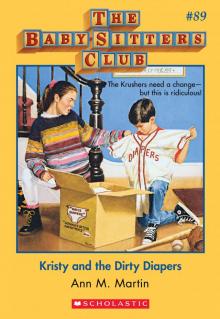 Kristy and the Dirty Diapers
Kristy and the Dirty Diapers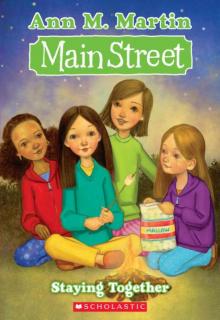 Staying Together
Staying Together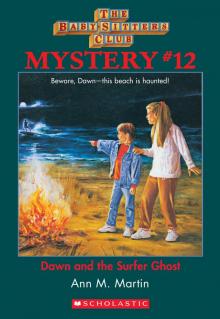 Dawn and the Surfer Ghost
Dawn and the Surfer Ghost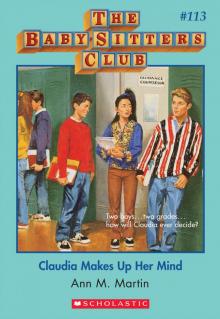 Claudia Makes Up Her Mind
Claudia Makes Up Her Mind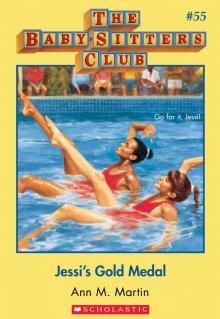 Jessi's Gold Medal
Jessi's Gold Medal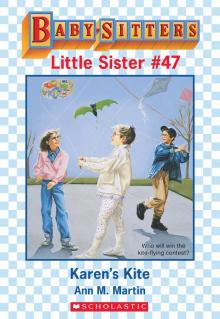 Karen's Kite
Karen's Kite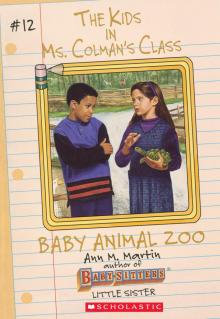 Baby Animal Zoo
Baby Animal Zoo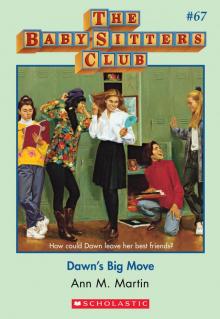 Dawn's Big Move
Dawn's Big Move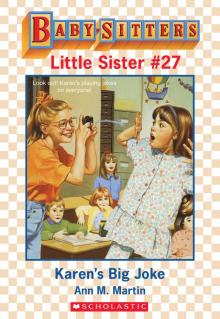 Karen's Big Joke
Karen's Big Joke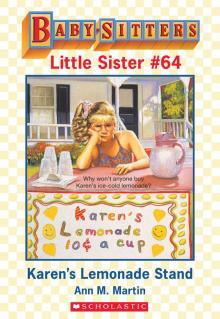 Karen's Lemonade Stand
Karen's Lemonade Stand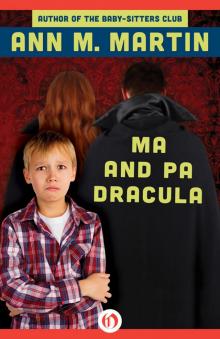 Ma and Pa Dracula
Ma and Pa Dracula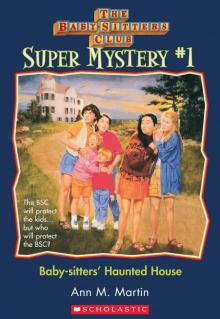 Baby-Sitters' Haunted House
Baby-Sitters' Haunted House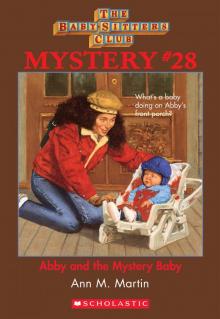 Abby and the Mystery Baby
Abby and the Mystery Baby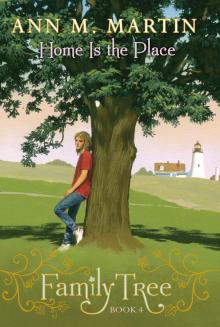 Home Is the Place
Home Is the Place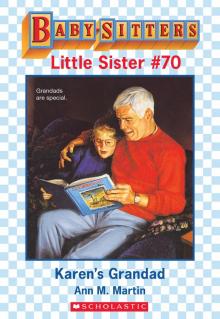 Karen's Grandad
Karen's Grandad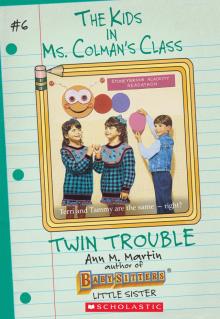 Twin Trouble
Twin Trouble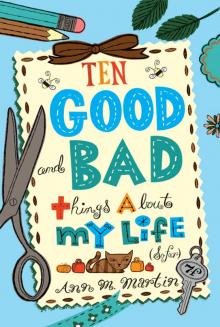 Ten Good and Bad Things About My Life (So Far)
Ten Good and Bad Things About My Life (So Far)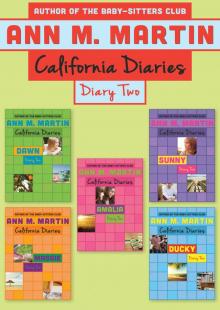 Diary Two
Diary Two Baby-Sitters Club 027
Baby-Sitters Club 027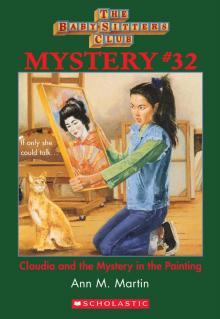 Claudia and the Mystery Painting
Claudia and the Mystery Painting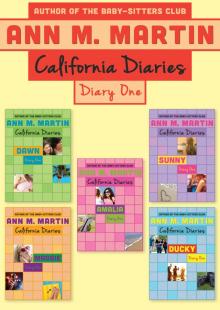 Diary One
Diary One Baby-Sitters Club 037
Baby-Sitters Club 037 Baby-Sitters Club 028
Baby-Sitters Club 028 Baby-Sitters Club 085
Baby-Sitters Club 085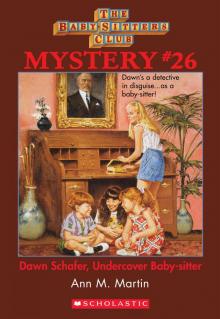 Dawn Schaffer Undercover Baby-Sitter
Dawn Schaffer Undercover Baby-Sitter Jessi's Babysitter
Jessi's Babysitter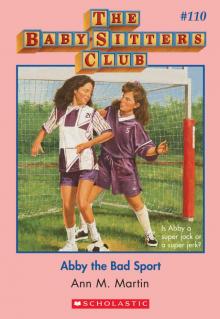 The Baby-Sitters Club #110: Abby the Bad Sport (Baby-Sitters Club, The)
The Baby-Sitters Club #110: Abby the Bad Sport (Baby-Sitters Club, The) Karen's Little Sister
Karen's Little Sister Baby-Sitters Club 058
Baby-Sitters Club 058 Claudia And The Genius On Elm St.
Claudia And The Genius On Elm St.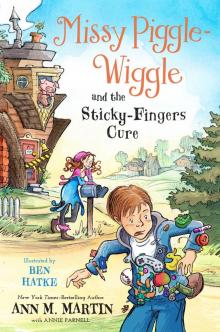 Missy Piggle-Wiggle and the Sticky-Fingers Cure
Missy Piggle-Wiggle and the Sticky-Fingers Cure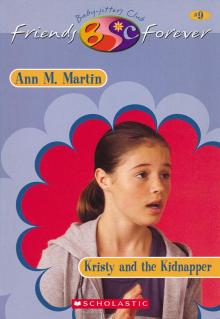 Kristy and Kidnapper
Kristy and Kidnapper Baby-Sitters Club 041
Baby-Sitters Club 041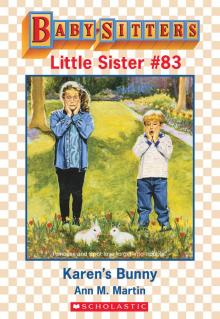 Karen's Bunny Trouble
Karen's Bunny Trouble Baby-Sitters Club 032
Baby-Sitters Club 032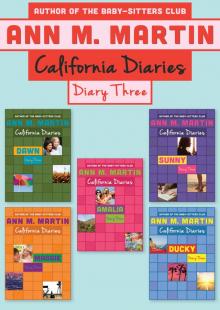 Diary Three
Diary Three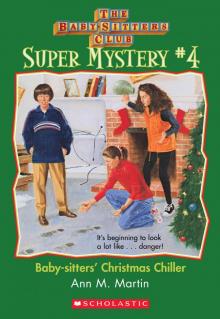 Christmas Chiller
Christmas Chiller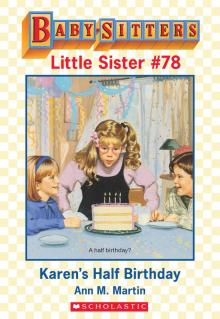 Karen's Half-Birthday
Karen's Half-Birthday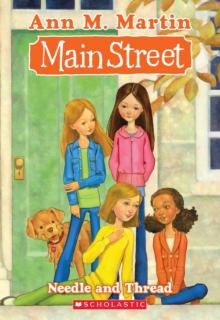 Needle and Thread
Needle and Thread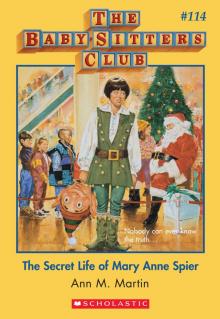 Secret Life of Mary Anne Spier
Secret Life of Mary Anne Spier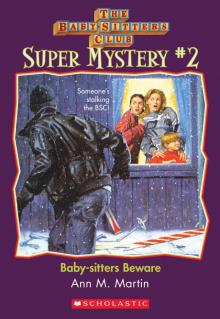 Baby-Sitters Beware
Baby-Sitters Beware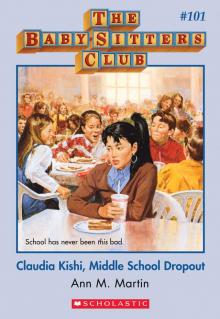 Claudia Kishi, Middle School Drop-Out
Claudia Kishi, Middle School Drop-Out Logan Likes Mary Anne !
Logan Likes Mary Anne ! Baby-Sitters Club 061
Baby-Sitters Club 061 Best Friends
Best Friends Baby-Sitters Club 031
Baby-Sitters Club 031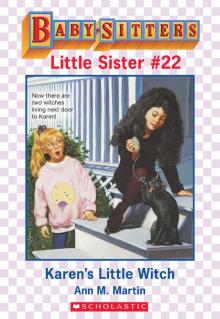 Karen's Little Witch
Karen's Little Witch Jessi Ramsey, Petsitter
Jessi Ramsey, Petsitter Baby-Sitters Club 123
Baby-Sitters Club 123 Baby-Sitters Club 059
Baby-Sitters Club 059 Baby-Sitters Club 033
Baby-Sitters Club 033 Baby-Sitters Club 060
Baby-Sitters Club 060 Baby-Sitters Club 094
Baby-Sitters Club 094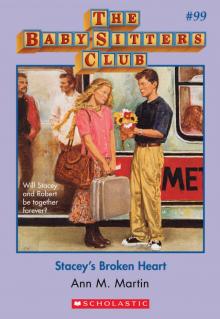 The Baby-Sitters Club #99: Stacey's Broken Heart
The Baby-Sitters Club #99: Stacey's Broken Heart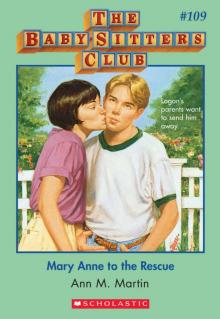 The Baby-Sitters Club #109: Mary Anne to the Rescue (Baby-Sitters Club, The)
The Baby-Sitters Club #109: Mary Anne to the Rescue (Baby-Sitters Club, The) Mystery At Claudia's House
Mystery At Claudia's House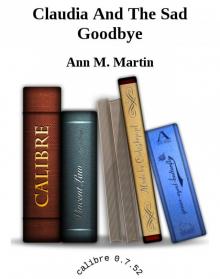 Claudia And The Sad Goodbye
Claudia And The Sad Goodbye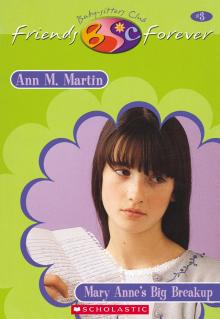 Mary Anne's Big Break-Up
Mary Anne's Big Break-Up Baby-Sitters Club 025
Baby-Sitters Club 025 Baby-Sitters Club 042
Baby-Sitters Club 042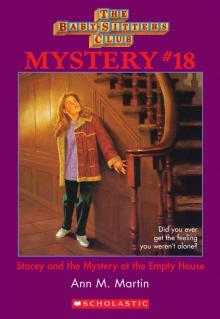 Stacey and the Mystery of the Empty House
Stacey and the Mystery of the Empty House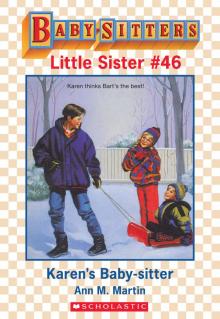 Karen's Baby-Sitter
Karen's Baby-Sitter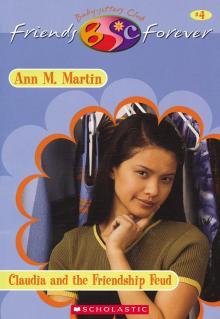 Claudia's Friendship Feud
Claudia's Friendship Feud Baby-Sitters Club 090
Baby-Sitters Club 090 Baby-Sitters Club 021
Baby-Sitters Club 021 Baby-Sitters Club 056
Baby-Sitters Club 056 Baby-Sitters Club 040
Baby-Sitters Club 040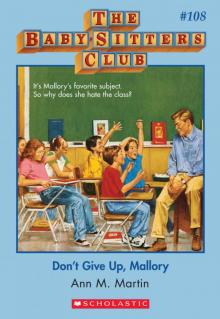 The Baby-Sitters Club #108: Don't Give Up, Mallory (Baby-Sitters Club, The)
The Baby-Sitters Club #108: Don't Give Up, Mallory (Baby-Sitters Club, The)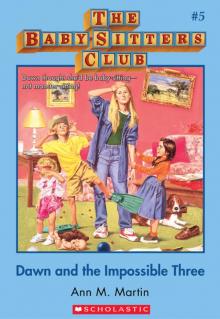 Dawn and the Impossible Three
Dawn and the Impossible Three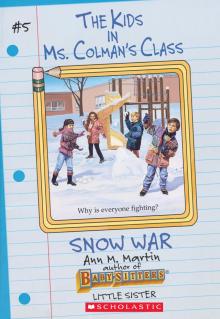 The Snow War
The Snow War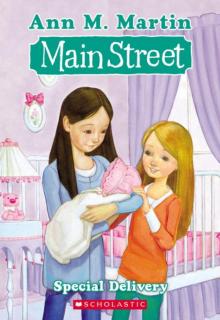 Special Delivery
Special Delivery Baby-Sitters Club 057
Baby-Sitters Club 057 Mary Anne And Too Many Babies
Mary Anne And Too Many Babies Baby-Sitters Club 030
Baby-Sitters Club 030